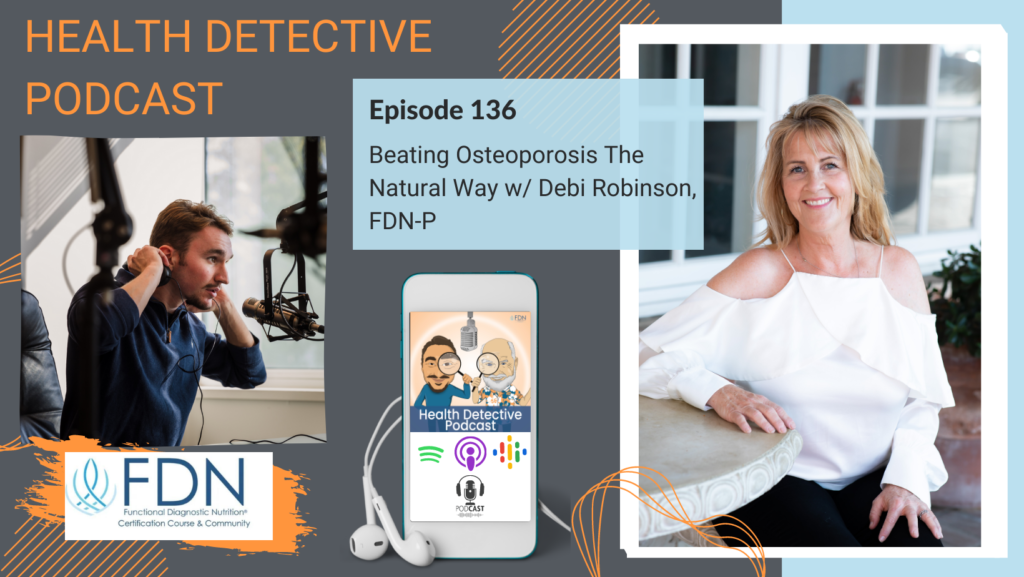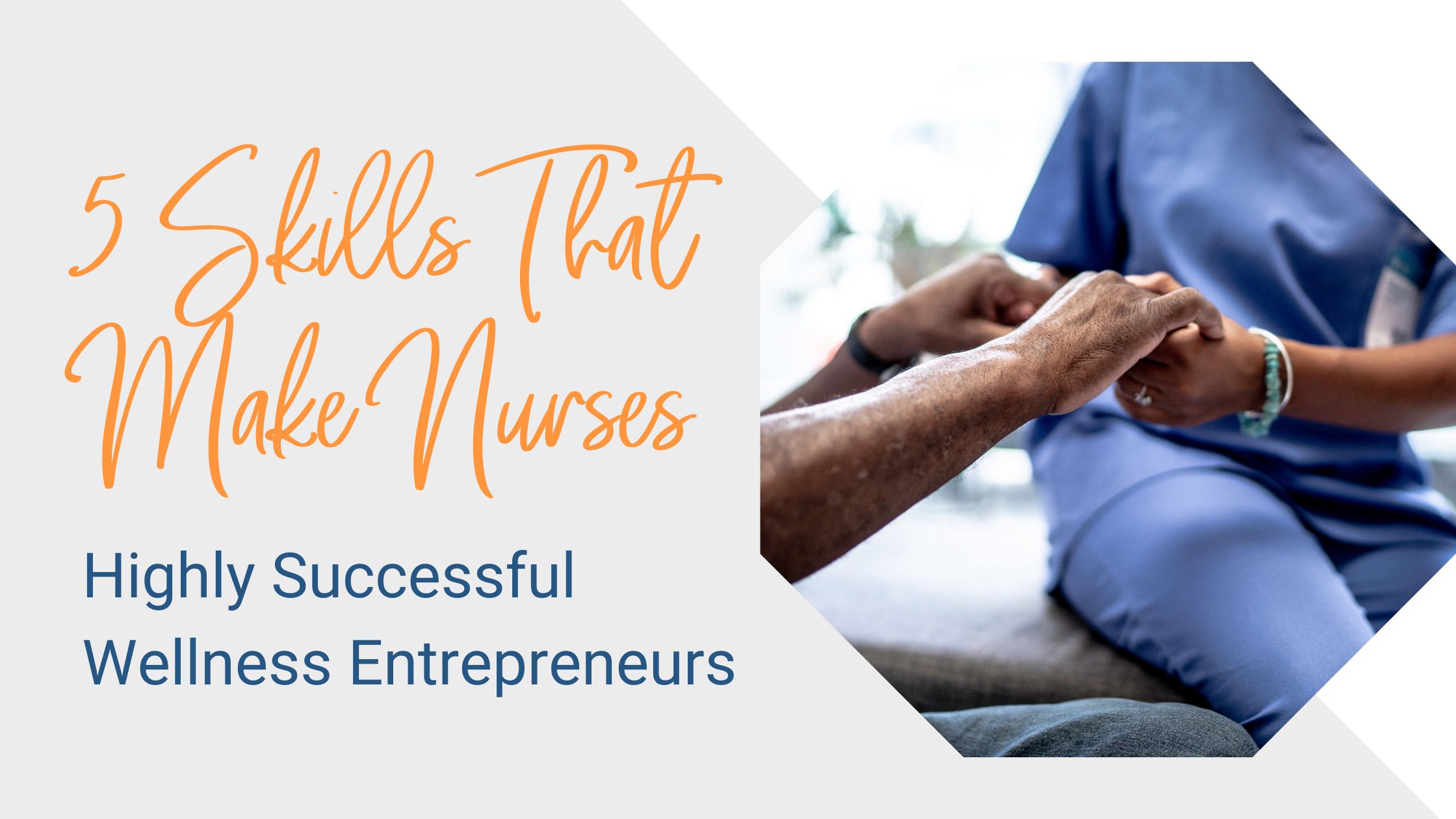Introduction
[00:00:00] Detective Ev: Hello, my friends. Welcome back to another episode of the Health Detective Podcast by Functional Diagnostic Nutrition. My name is Evan Transue, AKA Detective Ev. I will be your host for today’s show. We are talking with Debi Robinson who is going to reveal a lot to us about beating osteoporosis the natural way.
It’s a cool topic in general, I must admit. As I always tell you guys, if you’ll leave us a review, leave us a comment and tell us what you’d like to hear, I am always going to do my best to make that happen for you. Someone left this in a review and technically we prefer if you leave it as a comment on our Podbean. However, this person also left us a five-star review at the same time. So quite frankly, I have zero complaints.
I would like to send a personal shout out and thank you to our friend. We really appreciate you leaving a suggestion here for osteoporosis. And how after 130 something episodes, have we not talked about that? Great idea.
A Little About Debi Robinson

With that said, I want to give you guys a little information about Debi, the person that we will be talking to today. She helps women find natural approaches to osteoporosis and bone health by helping them identify root causes of their bone loss. She has helped hundreds of women already rescue they’re spiraling out of control bone loss, improve their DEXA scan scores, and learn a lifestyle that leads to a stronger body, bones, and balance so they can live a very active lifestyle.
At 51, Debi had a total hip replacement and understands what it feels like to be anxious about your body and bones. She creates online programs, teaches weekly classes, and hosts live group masterclasses to teach her clients and students that it is possible to reverse bone loss.
Outside of the general knowledge that she has, I love the energy Debi brought to this podcast. It’ll make this entire 50, 60 minutes go by in the blink of an eye, and you will learn something along the way. Without further ado, let’s get to the episode.
All right. Hey there, Debi. Thanks so much for being here with us today.
Debi Robinson: Thank you for having me.
Detective Ev: Guys, I always tell you to do this, and I listen to you every time. When the audience members reach out and ask a question or request a specific thing, I’m going to do my best to use our network, to find someone. And we found someone immediately.
We have someone here today that actually more or less specializes in this. We don’t technically label it as a specialty in FDN, but that’s your niche, that’s who you’re helping with. You might have your own personal story with that, I’m guessing, based on what I’ve read.
Debi’s Start with Beating Osteoporosis
We’re going to start today though with the same question we always start with on this podcast. When did your health symptoms start and what did they look like? Very few of us get into this work by accident. It’s normally because we had our own challenges.
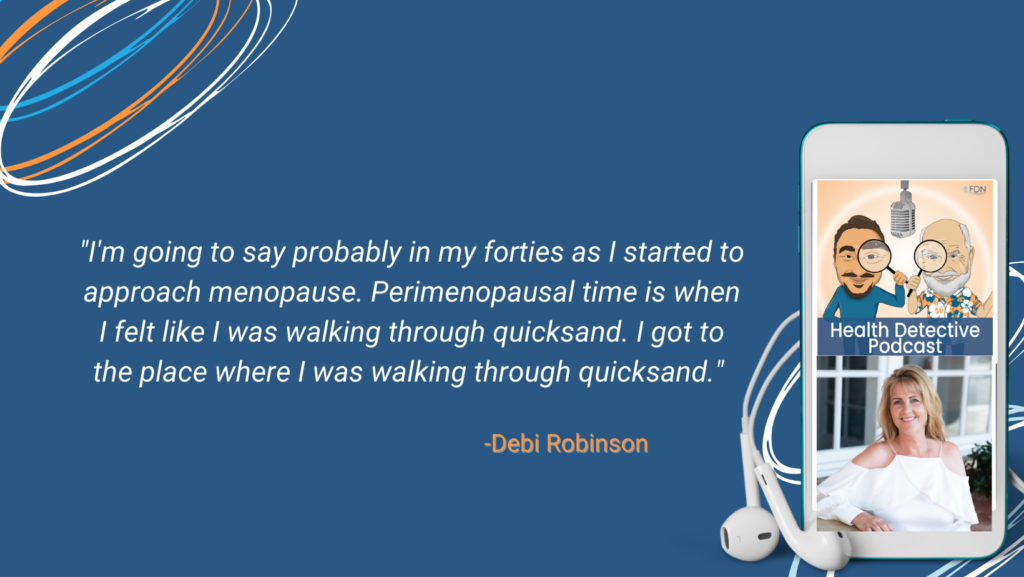
[00:03:12] Debi Robinson: I’m going to say probably in my forties as I started to approach menopause. Perimenopausal time is when I felt like I was walking through quicksand. I got to the place where I was walking through quicksand.
[00:03:23] Detective Ev: What was happening specifically at that time? Like what does that mean? Is that fatigue? Is that just brain fog?
[00:03:28] Debi Robinson: I had little kids, well, not so little: 14, 16, and 18. I had burnt the candle at both ends in my thirties without realizing what effects that will have later on in life. I was tired, brain fog, just all of it. To be that way in your early forties, it just shouldn’t be happening like that.
[00:03:48] Detective Ev: That’s something I’m always curious about. So, this is happening to you. You say, now this shouldn’t be happening to you, but I find many people are not necessarily aware of that. They’ll contribute to, oh, I’m getting old. I’m like, you’re 40. Where did you get that that’s old? That’s not how it should be.
Did you understand that at that moment, that that shouldn’t be happening? Or did you just contribute it to other things like I’m stressed or I’m getting old or something?
A Really Deep Abnormal Fatigue

[00:04:08] Debi Robinson: Yeah, I realized it shouldn’t be happening. We had a foreign exchange student coming to visit. I wanted to do so much for these kids, make all these plans for them. I couldn’t actually do the things that I did the year before for them. And it was like a realization for me that my level of fatigue is not normal. It’s a really deep fatigue. So yeah, there was that realization.
[00:04:28] Detective Ev: Even though that stinks, I’m still glad that you were able to connect that. It sounds like the shift happened so quick that it wasn’t just something that we can write off to age or stress.
You’re like, wait a second. Last year I could do all these things and in one year. Yeah, that’s not how age happens. It’s like over 80, 90 years that we actually get to a point where we’re like, okay, maybe I can’t go run 20, 30 miles anymore. I got to slow it down a bit. But guys, I always try to stress this, anytime this stuff’s happening rapidly, and rapidly could be a year. That’s when we have to put our detective hats on and kind of wonder what’s going on here?
What was your first route, Debi? Did you take a more traditional kind of route, like go to the doctor and try to see what was going on?
Heading Towards Beating Osteoporosis – A Naturally Minded Person
[00:05:06] Debi Robinson: No, not really. I’ve never been that person. I’ve always been naturally minded, always want to do things natural. I was starting to dabble in the functional health space, finding people, following their protocols. Started studying with Dr. Sara Gottfried and her Hormone Cure. Cause this was a hormonal issue, I believed.
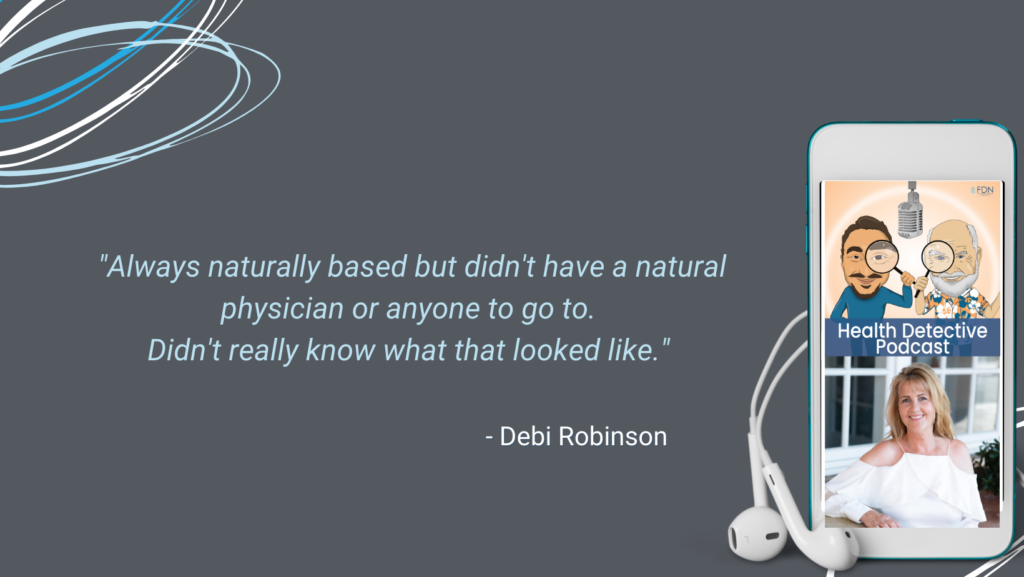
From there found Sean Croxton, from there found FDN. When you can run functional labs and actually get concrete evidence or look at certain areas, it was like, wow. Always naturally based but didn’t have a natural physician or anyone to go to. Didn’t really know what that looked like.
So, this was like, Wow!
[00:05:43] Detective Ev: I’m always fascinated by this. I’m actually obsessed with the idea of what allows some people to think this way. Unfortunately, I think all of us can think of an example of this, a very intelligent, very wise person in our life that ended up dying because of the condition that they had, because they refused to see outside of that paradigm of Western medicine. I haven’t been able to contribute it to intelligence, a specific type of personality, or anything really. I’m always fascinated then with what allows this person to think more naturally.
When you say that you’ve always been this way, was there a parental influence? Was it just something that you had a curiosity about as a kid? Like what does that mean that you were always just naturally oriented? Where did that come from?
Heading Towards Beating Osteoporosis – Environmentally Conscious
[00:06:18] Debi Robinson: That’s interesting. Who knows? My parents were Scottish. My mom, because they immigrated from Scotland to here, never really let us watch TV much. Always made us go outside and walk. Was that education there? I don’t know.

I’ve always been environmentally conscious and all of that. I never really had water bottles when I would host parties for my kids in sports. I’m the neurotic one that was filling up pitchers of water with my water filter. I’ve just always been aware of this. I want to treat nature with nature. You know, the body tries to find homeostasis and balance and so everything can be balanced naturally. I’ve always been inclined that way.
[00:06:55] Detective Ev: It’s good enough for me. I think that’s really what I’ve seen more than anything. You’re actually kind of a cool rarer case where 10% of people will say that they kind of always just had this awareness, this idea that this makes sense.
I think that’s actually very logical, because as humans, we should have this intuition that nature is something that we should be in alignment with. I always make a joke that as smart as we are, we’re the only humans that need nutrition facts and meal plans to figure out our diet. Do you think I have to tell a bird or a snake or a cow or whatever, what they need to eat? No, they just go and figure it out and they know exactly what they need to eat.
It’s almost like our intellect has outweighed our intuition, just what we know we should be doing. There is this awareness. There’s also this aspect of people just having a feeling that what they’re being told doesn’t make sense about their condition.
Heading Towards Beating Osteoporosis – The Mental/Emotional Aspect
I always encourage people if something is not making sense and you’re getting the treatment and it’s not working, go try something else. Feel free to go away from that path. I’m not suggesting that we act like we know more than doctors, most of us do not.
But you don’t need to be a doctor or a genius to figure out that what you’re being told might not be working as was the case for so many people that come on this podcast or work with us as FDNs. That’s a fair time to be like, I’m doing what you’re telling me. It’s not working. Maybe it’s time to go away from that beaten path.
You had listed off quite a few things with finding Sean Croxton, eventually getting into FDN. What was the first thing naturally oriented that did work for you for the fatigue? It could be a 10% type of improvement. I’m just curious to find, was it a dietary change, supplements? What was the first thing that worked to move that needle with the fatigue?
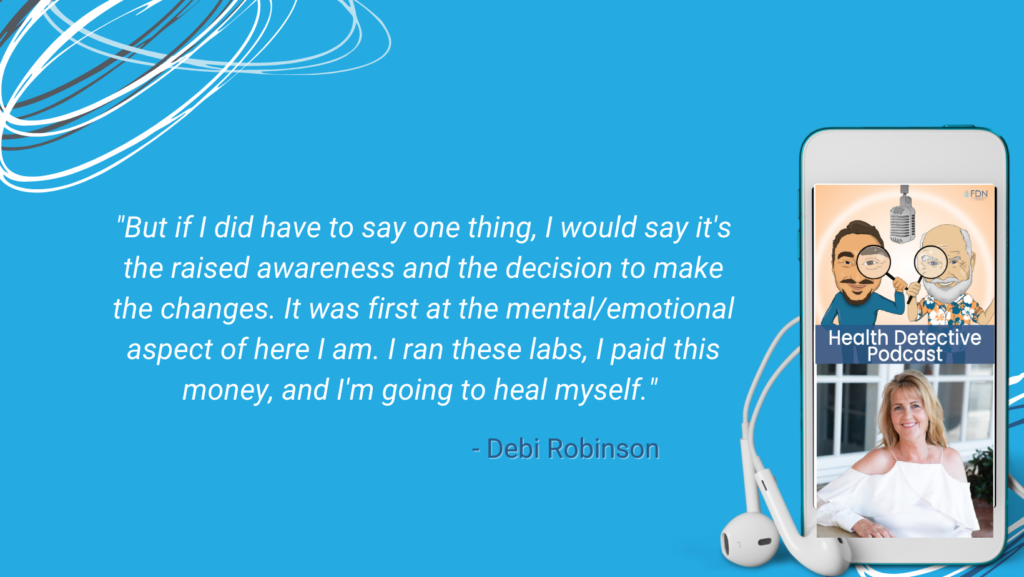
[00:08:29] Debi Robinson: I don’t think anything works in isolation, so it’s hard to say what exactly was it? But if I did have to say one thing, I would say it’s the raised awareness and the decision to make the changes. It was first at the mental/emotional aspect of here I am. I ran these labs, I paid this money, and I’m going to heal myself. Then it was the dietary shifts. That’s what made the no gluten, no this, no this, a little bit easier. Then there was supplements to help support. It was all of that.
Really, first it has to come with the decision to actually want to do this. And the labs really help here.
Mindset Has to Be Right Before Beating Osteoporosis

[00:09:05] Detective Ev: You had said something similar to that off air. I believe the exact same thing. I actually wrote one book on this topic and it’s not a complicated one. It was a personal goal. It is not the best book out there, that’s for sure. But of all the complicated health stuff that you and I both have the capability to get into because of our training, the first thing in there is the mindset stuff.
I recommend that if people have never done personal development, they’ve never done a thing related to that, the first thing you should be doing is when you start your morning, I just want them to listen to 15 minutes of something positive. They got to do that for 30 days.
Actually, my girlfriend and I, just before we got on here, we were grocery shopping and now we got back to be able to do this. We had literally been listening to Jim Rohn the entire way over. I do not go away even on my busiest days from 20 minutes of personal development material, whether that’s reading, audio. Sometimes it’s more, it usually is. But at least that 20 minutes.
What does that actually mean to make a decision? Like everyone would think, well, I bought the labs, of course I made a decision. Can we just elaborate on that a little bit? How does someone get into that right mindset? Or what allowed you to get into that mindset? Because again, some people will take these health conditions to their grave, unfortunately.
Beating Osteoporosis – Looking to Future Self for Motivation
[00:10:09] Debi Robinson: Yeah. In some ways that’s a really deep topic because that goes into the self-care. And when we’re talking about the self, that’s self-analysis of yourself, and are you willing to show up for yourself?
It’s part of what we do when we’re thinking of who to work with. I think the longer I do this, the more particular I get with who I want to work with. They are a part of this, a huge, big part and really in the, am I worth it, should I, can I do this? Then, being the coach or the guide or whatever, along the way to keep giving that information, but it’s that initial showing up that needs to take place.
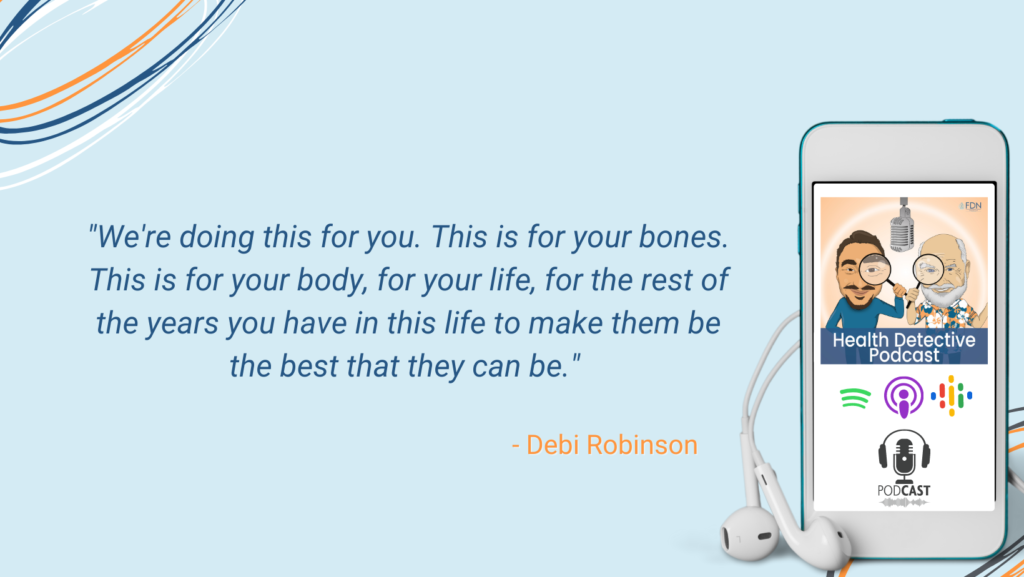
So, why is it for one versus the other? I don’t know. That’s an individual thing and I do that work with my clients. I do that work with, the you’re worth it. We’re doing this for you. This is for your bones. This is for your body, for your life, for the rest of the years you have in this life to make them be the best that they can be. That’s my big one.
That’s how I usually get people to make the decision or to stick with the decision is how many more years do you have left? Well, I shouldn’t even say it like that. That just sounds so mundane, right? There’s a better way to say that. Think of all the years you have left to live in your life, how do you want to live them?
I go for that future them that would be healthy and have energy, and in my case, stronger bones, more confidence, and not feel fragile and breakable.
Beating Osteoporosis – Going Deeper, Get to the Finish Line
[00:11:23] Detective Ev: I just think it’s cool because obviously we’re about to talk about osteoporosis today. But I love that this still starts with the mindset stuff. You can get all the labs, you could have the best practitioner in the world, and yet there’s clients all the time that don’t really do so well under that practitioner.
There’s others that have life-changing or even life-saving experiences. I think there’s some complexities in that outside of mindset, but generally speaking, it’s going to start with, did you actually want to change? Have you done the work necessary for that? I think it’s amazing when a practitioner can also offer that to clients or at least have the awareness around it, which you clearly do. Because yeah, it’s typically a lot more than that.

There’s also this fine line. They might have the mindset, and I’m not totally talking about myself. They might have the mindset to get them to a certain point and then they plateau off. They can’t realize why they can’t get that last 10, 15%, even though they know what to do.
That’s when I had to start diving into the deeper stuff. I’m still working on that. But I was so able to fix the 85% because that was where my personal self-worth and self-standards were. That last 10% to 15%, ehh, I wasn’t so bad. So, I had other stuff that I needed to work on, and I think it’s cool.
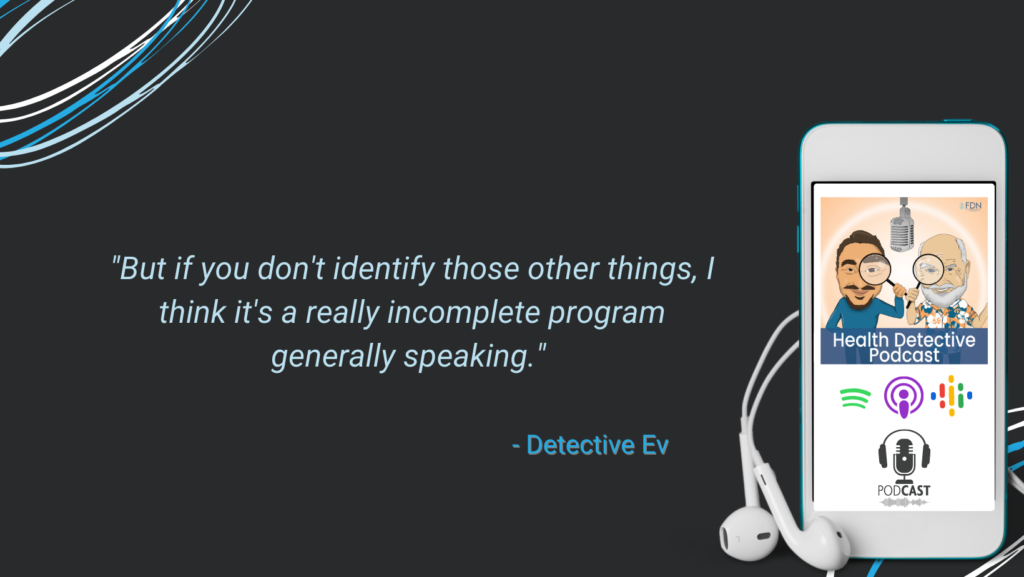
I really underplayed the significance of that when I first got into this work. I was all about biochemistry, all about the labs, very important stuff. But if you don’t identify those other things, I think it’s a really incomplete program generally speaking.
Beating Osteoporosis – Setting Firm Goals
[00:12:38] Debi Robinson: Totally. We’re all works in progress. As much as we know, and as often as we can run labs to look deeper, many things come up still. We’re works in progress. We slip; we’re only human. We do the best we can. When you take it in totality, if I look at Debi today from 2014 to where I am today, look at my energy and my level of health, I realize that it is the decisions I make every day, all day that got me to where I am.
That’s what I pass on to my clients. Jenn Malecha, I’m in her programs. Love her. I think she’s the best thing since sliced bread. She’s my mentor. I always tell her I could be your mom. She’s been amazing for me. She starts off her programs with that, setting your goals.
That’s why I say, think about the years you have left to live and how do you want to live them? Really having that – this is why I’m doing it. That’s when those slips or trips or decisions of, there’s that gluten or whatever, or not really fully saying, I’m gluten free.

Then we find anti-gliadin and gluten all over the place. Really deciding to go from, I won’t eat bread anymore, but wait, I need to also look at labels. And, ooh, is gluten here? Is it here? It’s that real deep goal and self-care model that gets people to really stick with things and get over the hurdles when you come to them.
I’m sure with you, with your clients, things are great. Dah, dah, dah, and then oops. Things happen again, right? It’s a constant self-care showing up for yourself. What are my goals? Why am I here? Why am I doing this?
Time Here is Short – Don’t Waste it
[00:14:07] Detective Ev: I love that you brought up Jenn.
Jenn was who got me in the FDN course years back. I saw her talking at a coffee shop in San Diego. There’s like 20 people there and she was obviously trying to get clients and quite frankly, she did. If you’ve ever heard Jenn talk, she’s going to get a client, that’s for sure. She also got a practitioner out of it because I was so fascinated by what she was talking about. That’s how I got into this. Jenn’s awesome. It’s cool to see her consistency and doing this better than ever before all these years later.
I like that you have that positive spin on how do you want to spend the rest of your years. I think there is validity to a little more straightforward way of saying that because that’s actually what I use with myself. I use this when I’m self-conscious about something that I’m needing to not be self-conscious about. You really shouldn’t ever be self-conscious if it’s just normal life stuff. I use it for a lot of things even motivation wise.
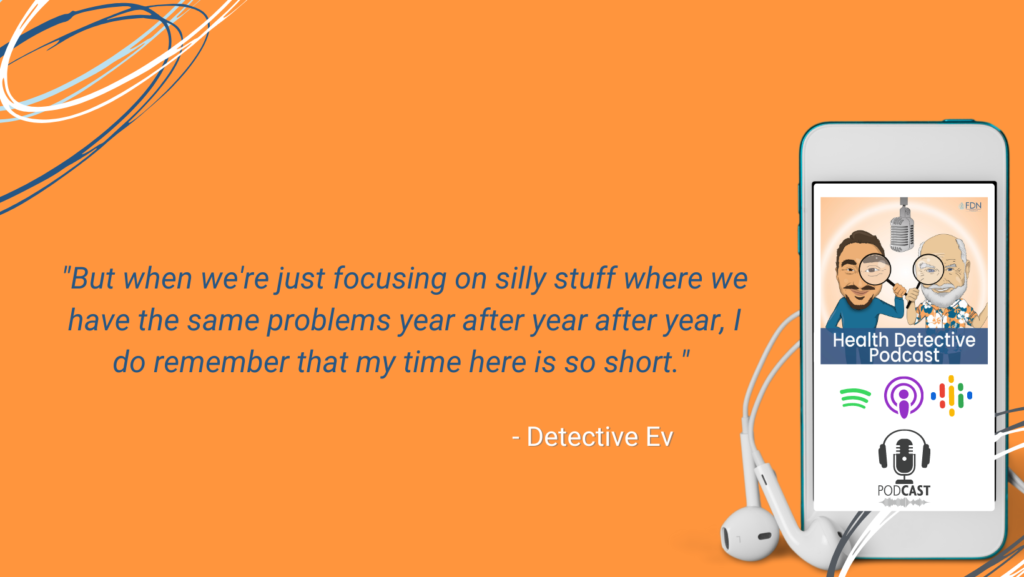
I think it was Steve Jobs that said, I forget the exact quote. But it was this idea that remembering I’m going to die is like the number one thing that motivates them. I never want to look at that in this morbid scary way. But when we’re just focusing on silly stuff where we have the same problems year after year after year, I do remember that my time here is so short. How much time do I want to spend with the same exact problem that I already have the solution to? All I got to do is get into the right mindset to fix it.
One Chance at Life – How to Live it?
I think that was one of the biggest things as someone who used to be very self-conscious. I couldn’t talk to anyone, let alone people on a camera or podcasts. It’s actually sometimes crazy thinking back, that I do this as a job when I couldn’t talk to anyone without blushing or being scared.
What I did is I just kept reminding myself I’m spending all this time worrying, does my hair look good. Or does this person think I’m too skinny, or whatever, all this stupid stuff. Is that how I want to spend my very limited time here worrying about this for hours and hours every single day?
It’s just not it. Easier said than done, but it’s a good reminder for all of us when all else fails.
[00:15:57] Debi Robinson: I’d love to speak with you. I’d love to even have a podcast on that. Just wanted to say, I’m in my mid-fifties, my clientele is typically 55 plus. I have people that are in their sixties, seventies, and eighties. We’re at the point in our lives where I think that is something we think of.
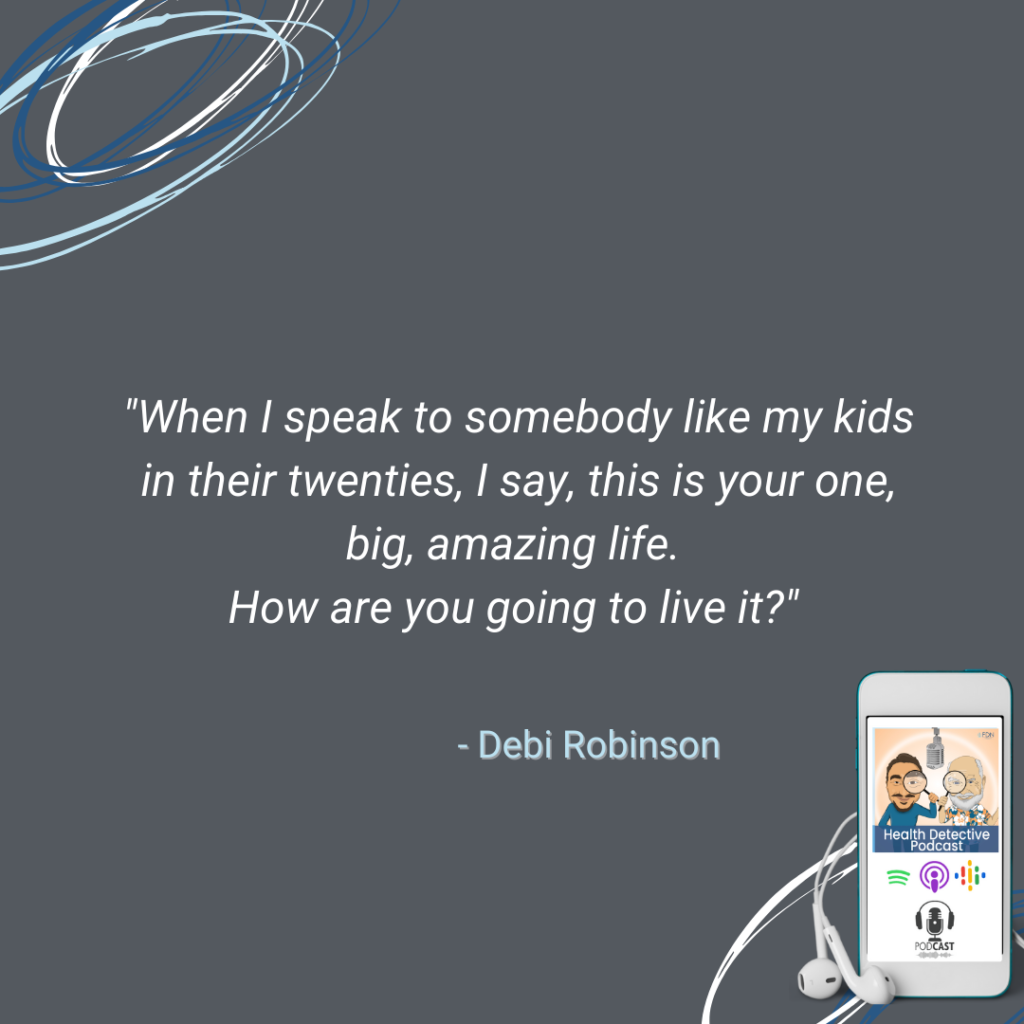
When I speak to somebody like my kids in their twenties, I say, this is your one, big, amazing life. How are you going to live it? You need to be the best you. You need to be healthy so you can do that. Showing up with energy every day, not having gut issues or whatever the issues are. It really depends on who I speak to.
Also, when you ask me my questions about how did I get into this, that’s why I do what I do. That is a big driver for why I do what I do, because I got to that place when I was fifty.
Beating Osteoporosis – First Steps to Health
[00:16:40] Detective Ev: I’m going to go back to when we got into FDN, Sean Croxton, all that stuff. When you got into the world of FDN from what you told me before, maybe it took a few years before you actually decided to go full in with FDN. Whenever you did end up doing it fully, what did you find from the lab results?
Was there anything really surprising that helped your own health while you were going through? I feel like you were pretty good with this stuff before going through FDN, but I’m sure there was some healing opportunity that was found on those labs.
[00:17:05] Debi Robinson: There was. I also found out I actually am healthier than I realized.
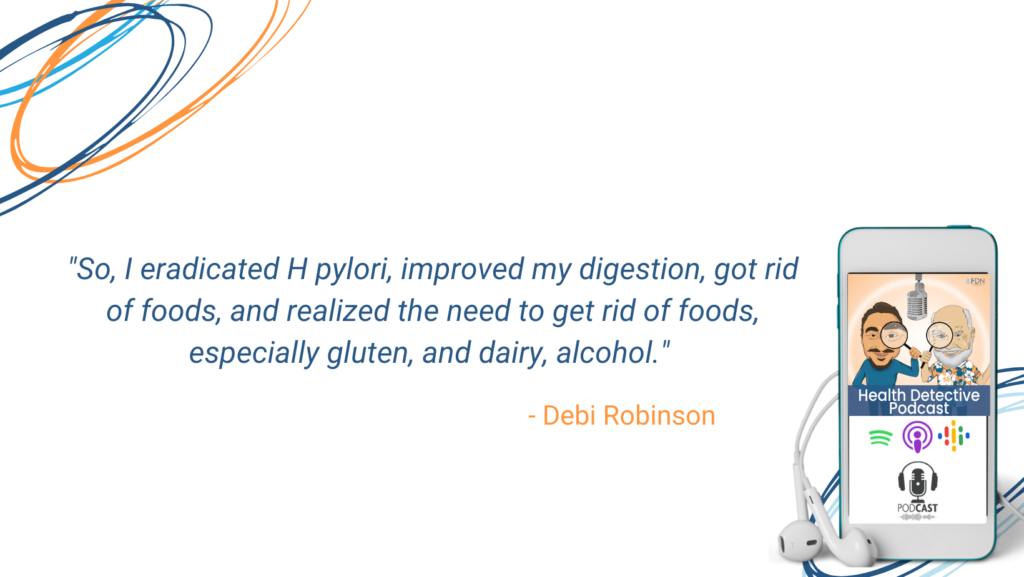
When you don’t have energy and you don’t have this, that, and the other, I realized not so much is coming up. What I did find was H pylori. So, I eradicated H pylori, improved my digestion, got rid of foods, and realized the need to get rid of foods, especially gluten, and dairy, alcohol.
I used to have a motto in life when my kids were little, when life gives you kids, make margaritas. That’s what I did. I used to drink all the time cause that’s managing your emotions, right? That’s calming you down at night. Coffee is waking you up and still dealing with the nervous system in some capacity and the mental layer of the nervous system.
But yeah, the H pylori that I found, the food shifts that I made were huge. Then realizing that we need supplements to support initially a little bit more probably. Those were my biggest shifts I would say.
Beating Osteoporosis – Torn Hip Joint
[00:18:03] Detective Ev: Now, before we get into the main topic of the day, which is the osteoporosis stuff people need to hear about that on our podcast, I want to go to the hip thing that happened with you in your early fifties. Did you have osteoporosis? What was going on with that?

[00:18:16] Debi Robinson: Forty-four years old in a crazy yoga class, burning the candle at both ends. My hip joint was torn. It was torn actually by the teacher. They pushed me. I felt the pop in my hip. For five years I tried to manage that. That’s also when I was going through perimenopause. 2014 is four years into my physical injury in my body. As we know, the three areas of stress that lead to ill health are musculoskeletal, biochemical, and mental/emotional.
We do a lot of biochemical here with FDN in our labs. There’s also that musculoskeletal aspect. Then you and I spoke a little bit initially about the mental/emotional. So had that injury and that contributed, it was part of the whole cascade, the whole metabolic chaos, the whole everything, chaos.
[00:19:00] Detective Ev: This was not like a diagnosis of something necessarily. It was just, hey, this happened to me, and it doesn’t really make a lot of sense?
Beating Osteoporosis – Arthritis Diagnosis at Fifty
[00:19:06] Debi Robinson: Well, it was my bones, right? It was my hip joint. I went into bones. I went into joints. You don’t usually have a DEXA scan, which is how they diagnose osteoporosis, until you’re menopausal. They usually don’t do baseline mammograms until somebody is either entering menopause or is menopausal. You do a DEXA scan, and you get a reading.
Five to seven years post-menopause is when the greatest decrease of bone density happens. So right around that 50- to 60-year-old range, maybe 55 to early 60s is when you’re going to really get the readings.
You go to osteopenia first, and then you go into osteoporosis. That’s when it starts to go here, because now you feel fragile and breakable. For me it wasn’t a diagnosis. I had a torn labrum in 2015. I had an MRA, not an MRI. MRA is when they do a dye and it’s called an arthrogram.
I know, I didn’t know that either.
[00:19:57] Detective Ev: I’ve never heard of it. I love this podcast; this is the best.
[00:19:59] Debi Robinson: It’s an arthrogram because they do a contrast dye in your joint. They’re looking at the joint to see the health of the bone and to see the tissue in the bone.
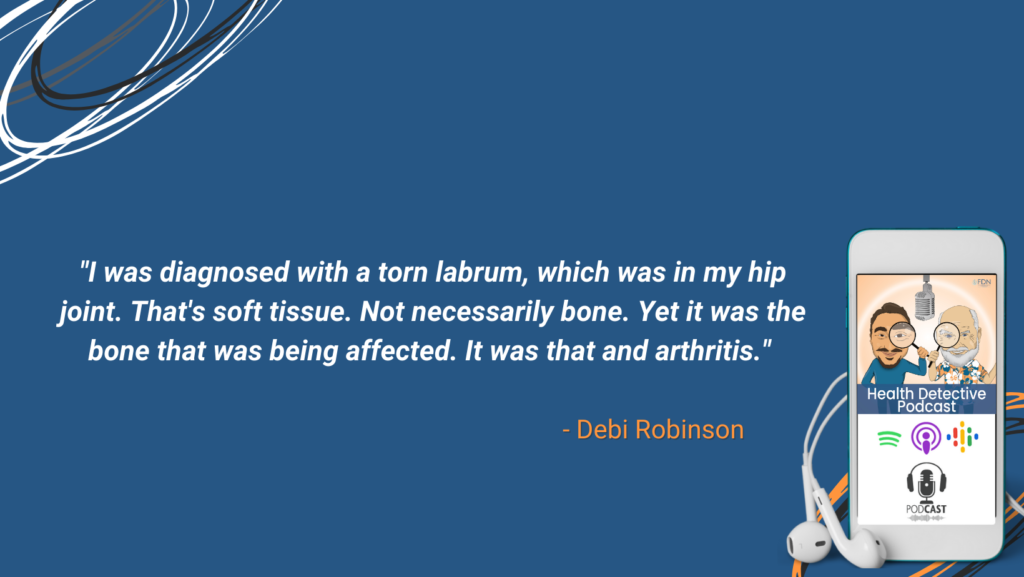
I was diagnosed with a torn labrum, which was in my hip joint. That’s soft tissue. Not necessarily bone. Yet it was the bone that was being affected. It was that and arthritis. So yeah, I guess there was a diagnosis of arthritis. At 50, 49 years old.
Beating Osteoporosis – Fear of Being Fragile
[00:20:21] Detective Ev: That is really interesting that you (for those on audio only), Debi, had pointed to the mindset more. I think that’s what you meant when you’re talking about feeling fragile or breakable and you instantly took me back. The only real major injury I’ve ever had was breaking my foot. That happened several years back. It’s actually only in the last year that I finally was able to run again and play basketball.
I mean, it was years of this stuff. But so much of that, even though there was real pain, there was so much of this idea that, oh, it’s going to happen again. It’s going to happen again. I had a constant paranoia that I had never had before in my life that I’m going to break or whatever.
This was practical. I got pushed in basketball, it made sense. I can’t even imagine when it’s something that’s less practical than a sports injury and someone is maybe one of your clients having this osteoporosis diagnosis. Now everything feels like it’s subject to breaking or being super fragile.
I feel like that could really get in your head.

[00:21:11] Debi Robinson: A hundred percent. It’s your foundation. That’s the center of your body. It’s how we do everything that we do. So that fear that came into you is exactly what comes into my clients or those with the diagnosis.
Beating Osteoporosis – #1 Disease of Menopause
Listen to this. Guess what the number one disease of menopause is, the number one. It’s Osteoporosis.
[00:21:29] Detective Ev: Well, I feel like I was about to say. I’m like, is this a trick? I did not know that.
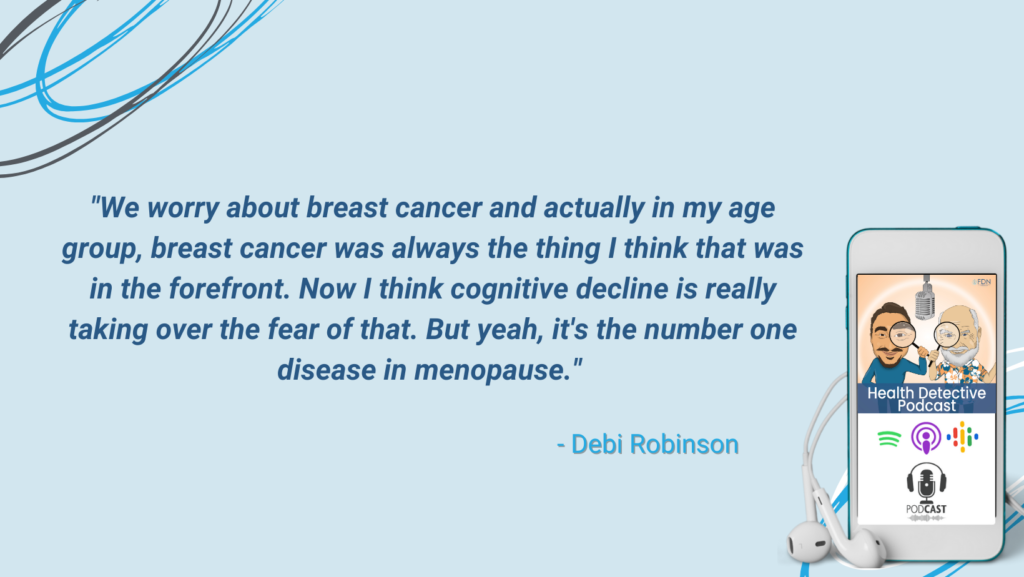
[00:21:34] Debi Robinson: Most people don’t. We worry about breast cancer and actually in my age group, breast cancer was always the thing I think that was in the forefront. Now I think cognitive decline is really taking over the fear of that.
But yeah, it’s the number one disease in menopause. It’s really that feeling of fragility and being breakable that then stops you from participating in life, in the activities you did. Like you said, as a young guy, you were a little cautious for a couple of years, right? You become cautious so you move less. Well, when you move less, you lose more. Use it or lose it.
Not only do you lose more musculoskeletal, it affects your biochemistry as we know. You’re not going to get that movement that you need, and you’re not going to utilize the byproducts and everything, the way we need the detoxification pathways, the sweating and all of that.
It just becomes, I guess, like Reed says a cascade and chaos.
Commercial Break – FDN Will be at Paleo f(x)
[00:22:23] Detective Ev: Hey guys, it is Detective Ev here popping in really quick. I just wanted to let you know, if you don’t know already, we will be at Paleo f(x) this year. Depending on when you’re listening to this, hopefully you heard it before Paleo f(x) happened.

We have a huge booth, an excessive amount of FDNs coming, and a lot of our FDNs will be speaking in one way or another. Ben Azadi will be speaking, Reed Davis will be speaking a few times I believe. I’ll be speaking once. We have an FDN panel, that’ll be there. Jenn Malecha will be speaking. All names that you’ve heard on this podcast if you’ve been a long-time listener.
We’re absolutely taking over Paleo f(x). You can check out our booth there. Say hi to us. We’d love to see you! Personally, it is going to be my first time at Paleo f(x). So, I’m very much looking forward to this. I’ve been going to a lot of the biohacking conferences for FDN recently with the team and I’ve been having a great time.
I’ve been to a ton of conferences in my life, but I’ve never been to health ones really, ironically. It’s like my people. I love getting to talk to you guys and meet you. If you are going to be there, come say hi.
Commercial Break – Try the FDN Course for FREE
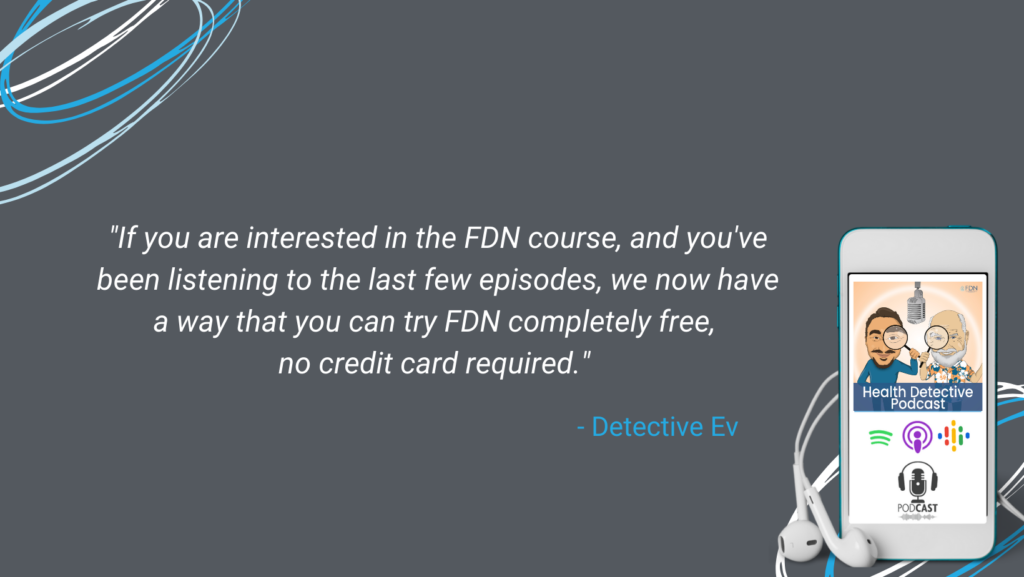
Also, if you are interested in the FDN course, and you’ve been listening to the last few episodes, we now have a way that you can try FDN completely free, no credit card required. We want the people to take FDN that actually need FDN. We know the people are out there. We know that if we could somehow advertise to all 7 billion people in this world, FDN would never have an issue. We’d have plenty of people, more than we could ever handle, coming through this. And we’d all be able to do great work for the world.
Because of this, we thought it was fair to allow people to actually try FDN. How do you do this? You go to fdntraining.com/tryfdn. That is fdntraining.com/tryfdn. Again, no credit card required, nothing like that. You’ll get an opportunity to see if this course actually is for you.
Then if you’re still maybe stuck on the fence, and you’re like, I thought this was good, but I’m not quite sure. Then you can just go to fdntraining.com/call and you can book a call with one of our advisors. So go to fdntraining.com/tryfdn to try the course. And if you still feel that you need more after that, you’re thinking maybe this is the right path, then you can go to fdntraining.com/call after that.
Beating Osteoporosis – Sedentary Lifestyle Doesn’t Help
All right. Back to the episode with Debi Robinson.
Detective Ev: That’s a really good point too about not moving as much because that’s exactly what happened. I mean, of all the things I’ve done stupid health wise as a young guy that was just never one of those things. I was always very active. I never like found a particular sport that I love, but I was playing basketball at the Y, I’d go weightlifting, I’d run, I’d hike, all these different things. Bike. I love biking.

Then it just seemed like, wow, I’m kind of pretty sedentary. Thank God I’m someone who actually remains naturally skinny because I realized, wow, dude, your muscles are getting weaker. You don’t have as much resilience that you had before. Thankfully I realize this now, it was a good taste of my own medicine because I think when I was younger, I had much more judgment towards the world for many different things.
I try to move away from that now and not judge other people, certainly have plenty of work to do there. But I had this judgment around like, how do these people, people that are 40, 50, whatever, I’m like, how do they lose this all? How do they stop being physically strong or active?
I know plenty of 40- or 50-year old’s that do this. And I realized how easy it would have been to happen to me. I’m like, dude, you’ve been sedentary almost for three years. And you are aware of this stuff. So how easy do you think it is for most people? They get one injury; they stop playing that sport that they played in high school or college.
Working with Debi Robinson
Then, yeah, of course they lose it over the next 20 years. They’re busy, they got kids, they got a family, they got a job. I think we just need a lot more awareness around this. Definitely helping people with that mindset side of things if they’re afraid and feeling fragile all the time. That’s the last thing we want them to feel.
So, when you’re working with your clients now where does this start? For those that don’t know, the FDN system is one that teaches you how to do things and you can copy that exact system. But we also don’t put people in a box. There’s absolutely ways to be flexible with this. You might have a different profession or a different certification, or even a degree that you came into the world of FDN with before.
Maybe you mix that into your practice. With whatever unique blend of stuff that you have, I’m curious, where do you start with clients? Someone that has this, wanting to work with you. How does that look?
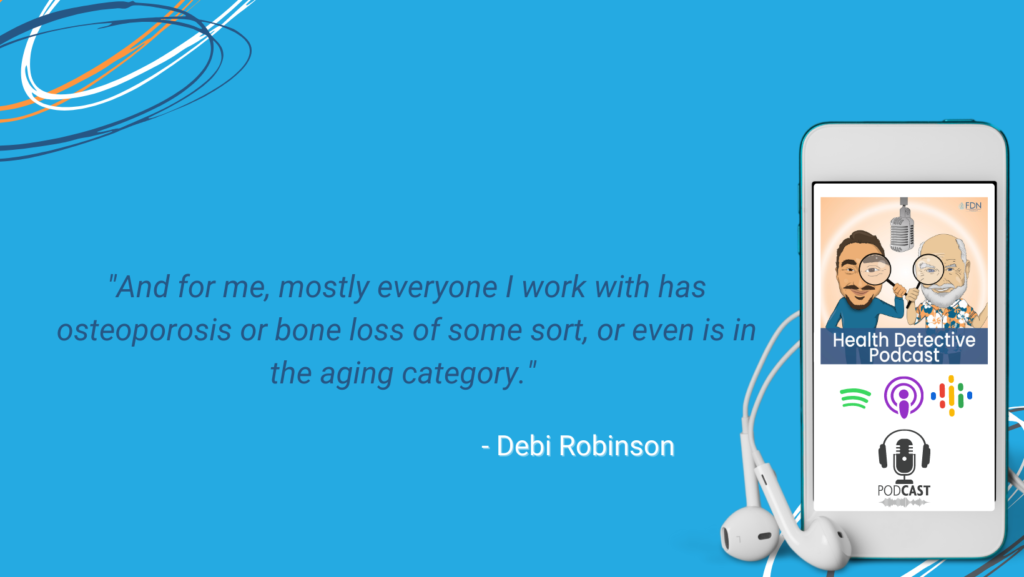
[00:26:29] Debi Robinson: Well, of course the intake. And for me, mostly everyone I work with has osteoporosis or bone loss of some sort, or even is in the aging category.
So, it’s the intake process.
[00:26:42] Detective Ev: I guess that was quite literal. I should’ve worded that better. I guess I just meant, like, do you run all five labs? Do you have any different interpretation with that? That’s kinda what I’m getting at.
Beating Osteoporosis – Uncovering Bone Loss Root Cause is Key
[00:26:51] Debi Robinson: I want to help them uncover root causes of bone loss, because that’s really what is the key for them here?
First osteopenia and osteoporosis is bone loss. You made a point about when you weren’t as active, you lost muscle. That sarcopenia. Well after your mid thirties, there is more lost than there is gain of bone tissue and muscular tissue, which will then contribute to less nervous system communication with the muscles. Then you go into a weaker balance.

All of these degenerative aspects are happening when we leave our thirties. Imagine 30 years later when you’re in your sixties, what that degeneration can add up to. Then it depends on what did you do in your life before this, to get here? You know, did you have an issue or an injury?
Did you have a diagnosis that made you feel more fragile, so you weren’t moving as much? Can you tell me the question again?
[00:27:37] Detective Ev: Well, I was just kind of talking about what it looks like when you first start with the person. Like if you run all five labs and it’s kind of standard FDN.
Beating Osteoporosis – Uncovering Inflammation Root Causes
[00:27:44] Debi Robinson: Root causes is what I’m looking at. I do question them, and I would say that in my population they need to be able to be digesting, absorbing, and assimilating their nutrients. That becomes a really big part because what I noticed is a lot of the ladies that come to me are on this slew of vitamins.
They think they should be taking calcium and magnesium and this and that and the other. It’s not even about the quality. They’re taking this bone formula, this hormone formula. When I have them show me what they’re on, I’m like, wow, look how much calcium you’re taking. Look how much this, look how much of that, because they’re not really thinking like that.
For me, my labs that I run are not necessarily the five standard FDN, partly because I got certified in 2017. Some of those are newer labs for me. I do the Zoomer panel, the foods zoomers, because food sensitivities. When I’m gonna say no dairy, especially no gluten, gluten with thyroid and gluten with osteoporosis, it’s a big no-no.
I know that we say gluten-free for a lot of different things, but with the thyroid, the gluten molecule, it looks a lot like the thyroid receptor. So, you actually will not let thyroid, which is a master metabolizer, get onto the cells. Well, with bone health, it’s also a big factor in bone health is gluten.
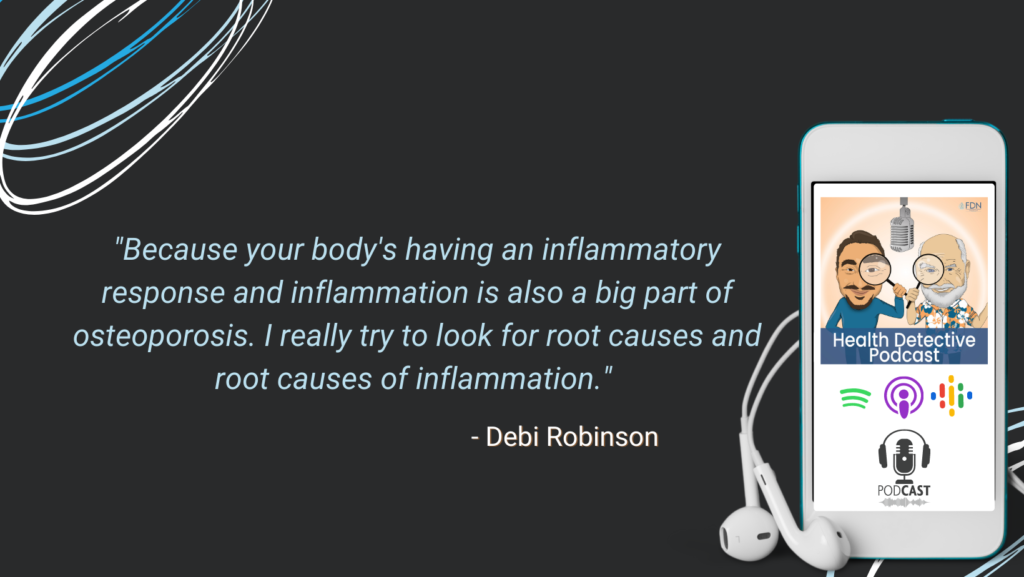
The Zoomer panels give me a really good, okay, here, Susie Q. This is what you should, or shouldn’t be eating, right? Because your body’s having an inflammatory response and inflammation is also a big part of osteoporosis. I really try to look for root causes and root causes of inflammation.
Beating Osteoporosis – Looking at Blood Sugar Regulation and Adrenal Function
I do a Zoomer panel. I do a GI MAP to look for leaky gut. What’s getting into your system and everything else that we look for in that panel. I do a DUTCH because that’s hormones. Hormones, especially estrogen, is very bone health protective, and you have to have. Even though we are in menopause, and we have less hormones, you still need to be utilizing them, metabolizing them, and being the best you can be, is what I like to say.
The last one that I run is the hair mineral. I really love the hair mineral. Often, I find a very high calcium, known as a calcium shell. Then that’s like, okay, look, Susie Q. You have a lot of calcium in your soft tissue. 99% of it should be in your bones. Then it’s more, we’ll look at the supplements you’re taking.
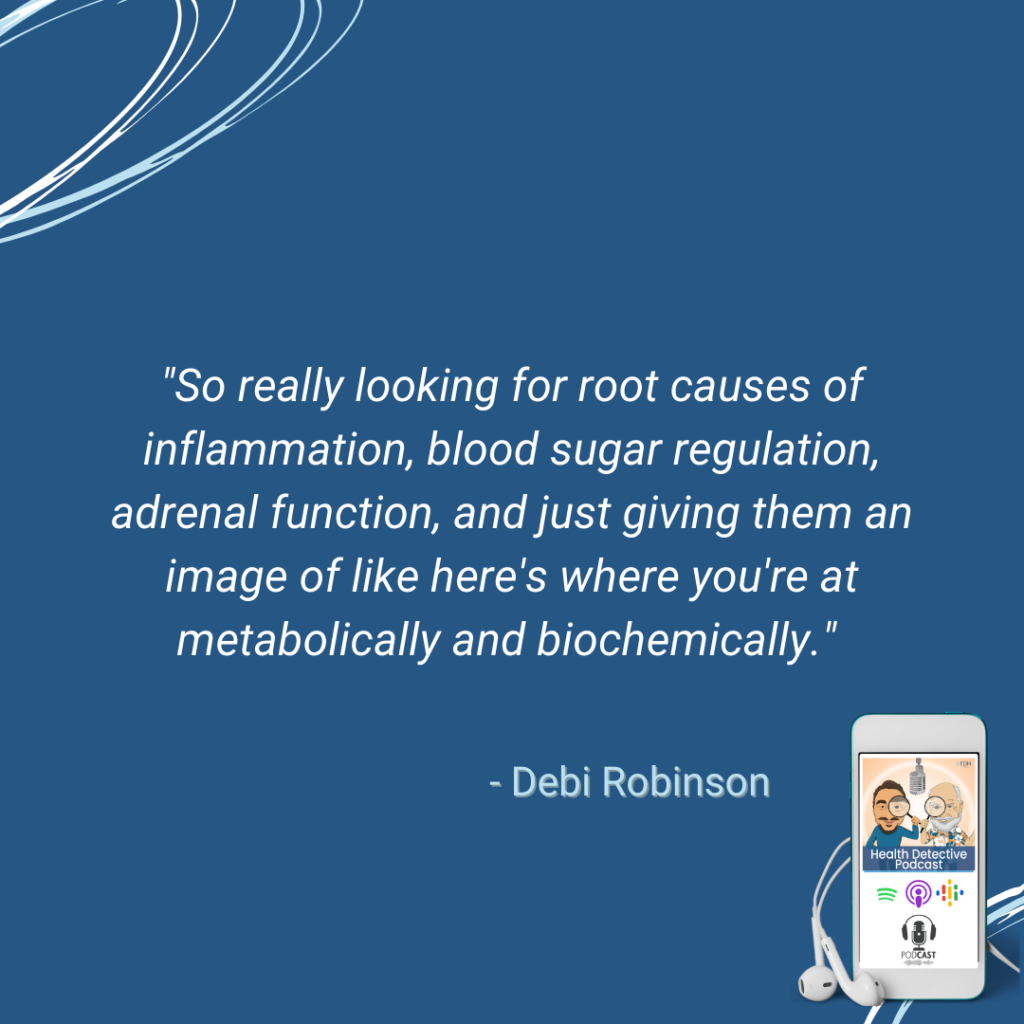
So really looking for root causes of inflammation, blood sugar regulation, adrenal function, and just giving them an image of like here’s where you’re at metabolically and biochemically.
[00:30:03] Detective Ev: For those again, maybe listening for the first time, this is what’s so cool about the world of FDN. We are going to teach you a set amount of labs in the course as a system, all in of itself, and you can use every single time.
But everything you just talked about, we also train people on in advanced modules or just even through our affiliates or whatever. You can kind of figure out your own personal blend. Because yes, I think there’s total validity to what you just said, especially with the population you’re working with.
Beating Osteoporosis – Does Osteopenia Come First?
It might look a little different, slightly different for someone who is really focused in the mental health arena. You know, maybe I don’t always need an HTMA. I’m not even saying that doesn’t have validity in the mental health world. But I might find that maybe something else works a little better for me with that population. And that’s totally cool. We have the flexibility to do that.
This brings up so many questions I want to start in a logical order. Osteopenia, I have heard of this. Admittedly, I don’t know what that is. But you had said this almost in a way that it seems like this always precedes osteoporosis, is that correct?
And then if so, what is it?
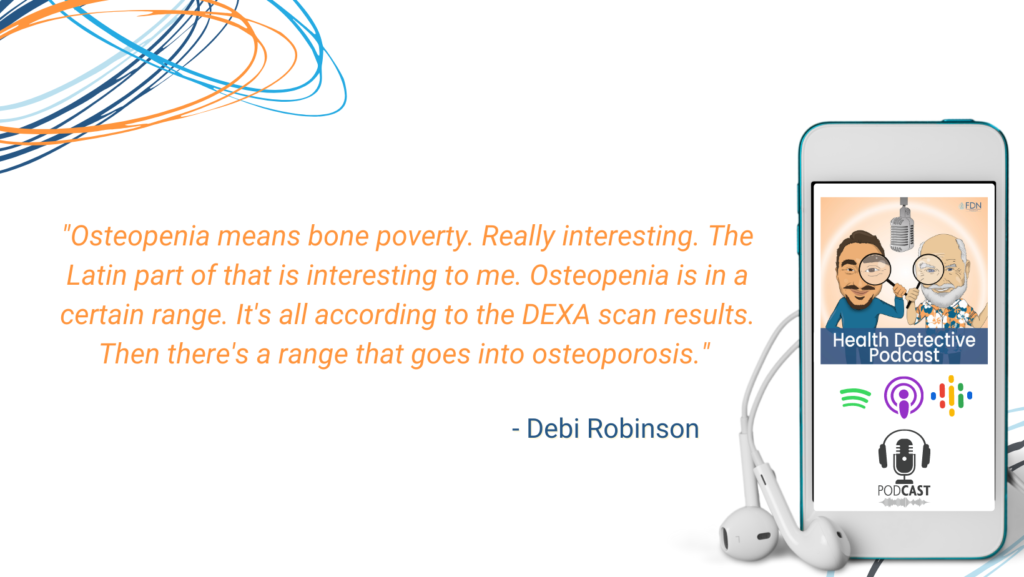
[00:30:58] Debi Robinson: Osteopenia means bone poverty. Really interesting. The Latin part of that is interesting to me. Osteopenia is in a certain range. It’s all according to the DEXA scan results. Then there’s a range that goes into osteoporosis.
You have a greater increase of fracture risk when you’re in that osteoporotic state. Cause that’s less dense, not necessarily less quality, so less dense bones. Yeah, osteopenia and then osteoporosis.
[00:31:25] Detective Ev: Just to be clear, whether or not it got caught at that time, osteopenia would have to have proceeded osteoporosis, a real diagnosis of that at one point. Is that correct?
Beating Osteoporosis – the DEXA Scan
[00:31:33] Debi Robinson: That’s an interesting question. I mean, could somebody be on some kind of crazy medication, like especially cancer medications where the bone loss was so significant and so quick that it would automatically go there? I don’t know. I mean, there’s a range. Negative – 1.0 to negative – 2.5 is osteopenia.

There is a range before you go into osteoporosis. I would say that normally, yes, you are in osteopenia. Although a lot of people don’t have DEXA scans until they’re 60. Not everybody gets a baseline, not everybody is running them early on. So, you don’t really know. The DEXA scan that they’re comparing us to is that of a 30-year-old population.
They actually look at (there’s a T score and a Z score), they look at your bone density in relationship to what it would have been at its maximum. They take a general group of 30-year olds.
[00:32:20] Detective Ev: We have that sarcopenia, that’s the muscle loss. I’m learning all these cool things from you today. Now, the DEXA scan, that’s the other thing you kind of just beat me to it. I wanted to go back to, because admittedly you’re opening up a lot of different topics to me, which is really interesting.
I always learn something on the podcast, but it’s rare that someone comes on, it’s just multiple things. I love that. With the DEXA scan, I admittedly had always thought that was something in a lot of functional wellness studios or gyms where people are getting their body fat percentage measured.
So this is something that Western medicine uses for osteoporosis as well?
Beating Osteoporosis – Can it Be Reversed?
[00:32:50] Debi Robinson: This is ordered by your OB GYN usually post-menopause. You lay down, it’s a really low x-ray. A light is going through your body and it’s whatever it picks up. It’s really low. I think that term is low eminent when they talk about how much of the light.
Detective Ev: That makes sense.
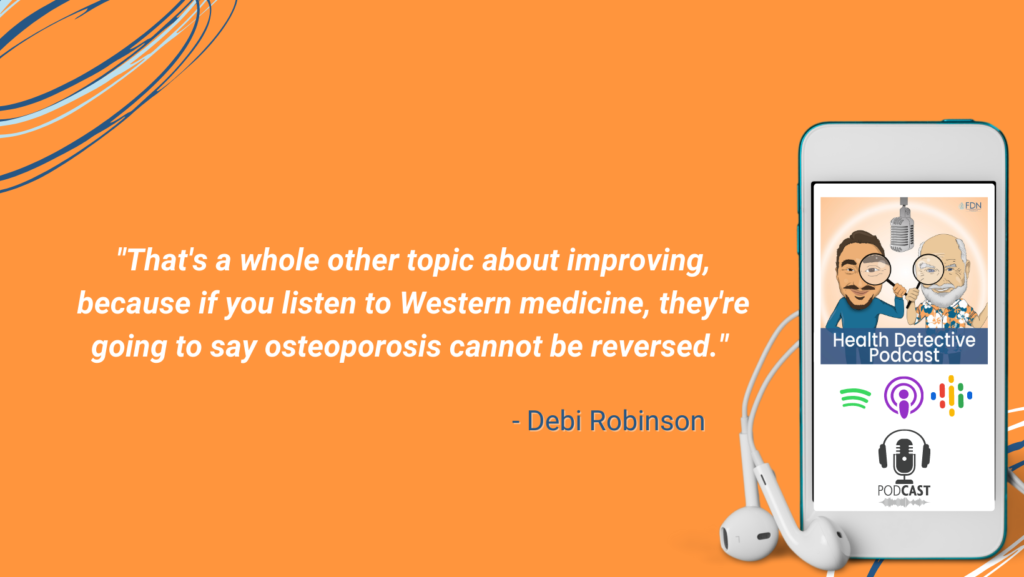
Debi Robinson: Anyway, they do it every two years. Bone metabolism is at a very slow rate. Usually, you get it done every two years to see, did you improve or not. That’s a whole other topic about improving, because if you listen to Western medicine, they’re going to say osteoporosis cannot be reversed.
That is so not true. There isn’t as much information about the reversal. Yet it’s happened for me. It’s happened for so many people I work with.
[00:33:28] Detective Ev: I’ve had one main one that was an incurable disease. I literally was told, they told me at 18, I’m going to lose hearing in one of my ears.
Well, I don’t use the medication for that. I haven’t in five years, I don’t have the hearing loss anymore. So, what do you call that? I call that cured. It’s amazing the things that get told.
And it’s by, just to be clear, well-meaning people that really do believe what they’re telling you. If they had it, they would say the same thing. But it’s just when you’re in this world, especially as someone who is lucky enough to get to talk, I mean, I’m interviewing people with these stories. All the time I hear the craziest things, seemingly craziest, that got reversed or cured.
Beating Osteoporosis – Let’s Look at Their Teeth
It’s like, okay, well, I more wonder what the limitations on that are. Like, how much can we heal? Because it doesn’t seem like there’s a limitation on it right now. I mean, yes, we get old, and we die. I’m pretty sure that’s going to happen. I’m confident of that one. But do we have to do that in a way that’s filled with misery and these crazy diagnoses of cancer, autoimmune, or whatever. I’m really moving away from that. I don’t believe that.
We’ve learned a lot already. Really cool.
I am curious when you’re taking on these clients, are you finding that there’s other notable correlations? Like, do they have other things commonly? Are their teeth messed up? That might be an unfounded question there, but I feel like in my head, well, if they all have calcium shells, like, is that affecting their teeth? Like, do they have other problems commonly outside of just the osteoporosis?
[00:34:45] Debi Robinson: That’s really a smart question, actually, Evan. Cause yeah, the nails, the teeth, and the bones are made of similar substances. So that’s really smart.
I have bigger programs that are more expensive, where I run all my labs. Then I have masterclasses in all these programs that I have people do self-diagnosis. That would be one of them is, look at your nails. What are your nails like? What are your teeth like?
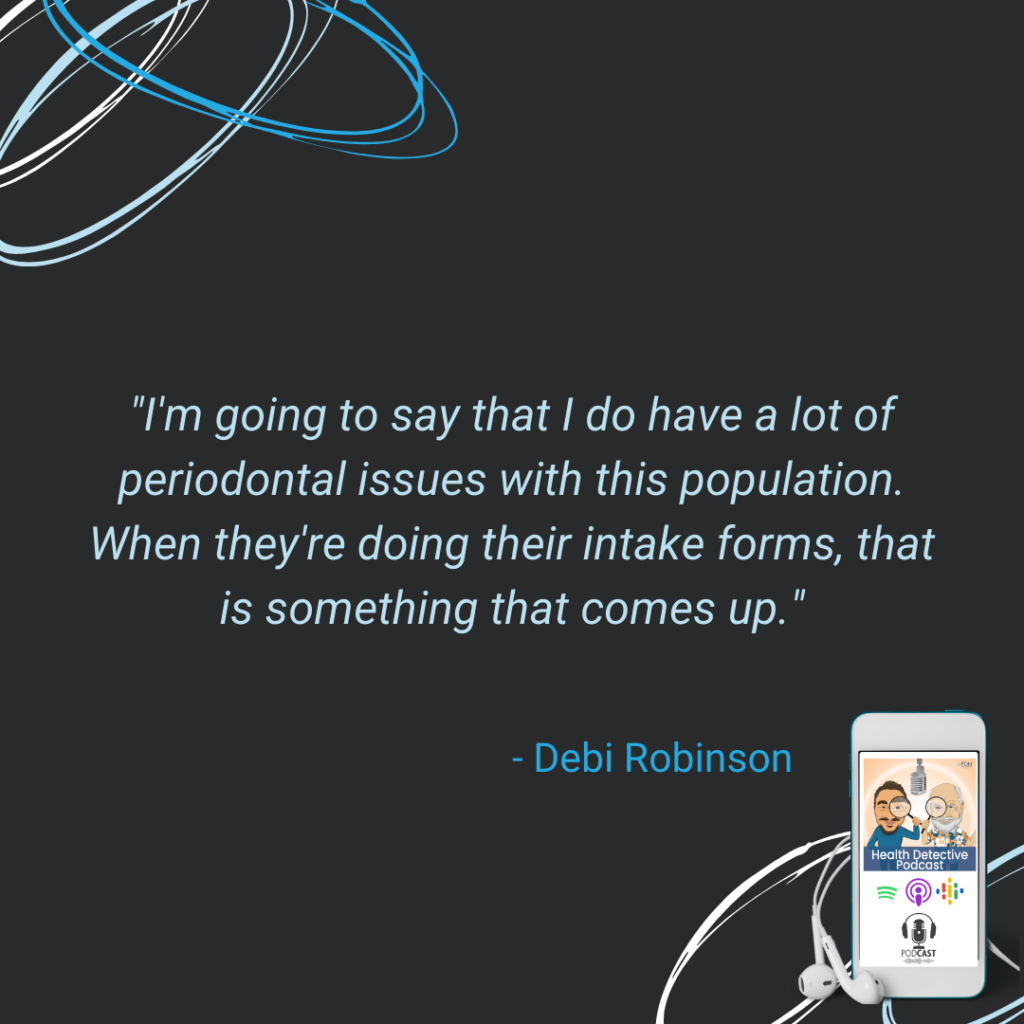
I’m going to say that I do have a lot of periodontal issues with this population. When they’re doing their intake forms, that is something that comes up. I would also say that there’s a bacterial imbalance aspect to that too.
Beating Osteoporosis – Living an Active Lifestyle?
That’s not just about the hardness of the teeth. That’s also about the gums. I’m really going to bring in my mind, I’m going to go into the bacterial imbalances in the mouth for that. I think I was with one of the clinical advisers and I asked a question, do you see a lot of this on your labs? You know, because of their population, they run. And they said, no, not really. I’m like, really, it’s almost in all of mine.
I’m starting to see, what are the things that are coming up more for my clientele, for women. I guess, cause most people I work with have bone density loss. Like I said, it’s the number one disease in menopause. It’s 55% of the people over age 50 have bone density loss at some level. For women, it’s, I told you, five to seven years, post-menopause. For men, it’s not till about age 70 because men don’t lose testosterone until around age 70. So, we don’t see this often.
Also, women’s bones are smaller, so there’s less light being picked up. So, it’s more diagnosed in females than men, 80% of those diagnosed are female. It’s really a big deal. But yes, I see certain things over and over. I don’t know if I look so much at the teeth. I really go inside, and I go up.
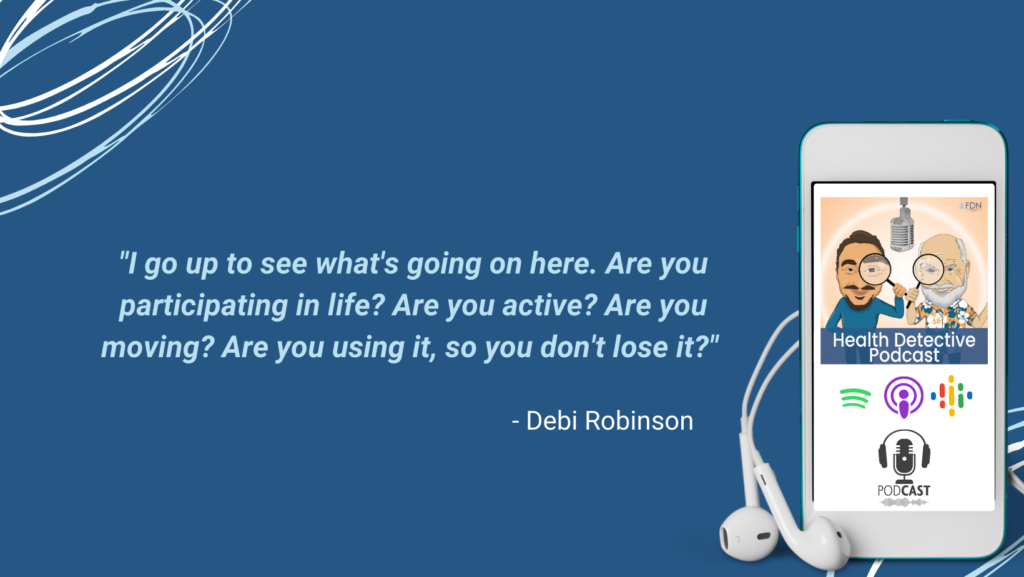
I go up to see what’s going on here. Are you participating in life? Are you active? Are you moving? Are you using it, so you don’t lose it? Then I look at the biochemistry through the functional labs. And then the intake forms and my questions with them because it’s everything, it’s all parts of the person.
Beating Osteoporosis – Lots of Dehydration and Oxidation
[00:36:35] Detective Ev: Really cool. That’s my next question, because I like to talk about like maybe correlations with other conditions or symptoms that they have. I find that interesting about the nails and the teeth and stuff. But then of course, what everyone wants to know is, what are you finding on the labs typically with these people?
I feel like there’s some pretty stereotypical answers that come up regardless of the condition, but I feel like this population might be a little different. You talked about the calcium shell with the HTMA. What else are we finding? Are they all actively consuming foods they’re sensitive to? Is the gut messed up a lot? Like what’s happening with these people?
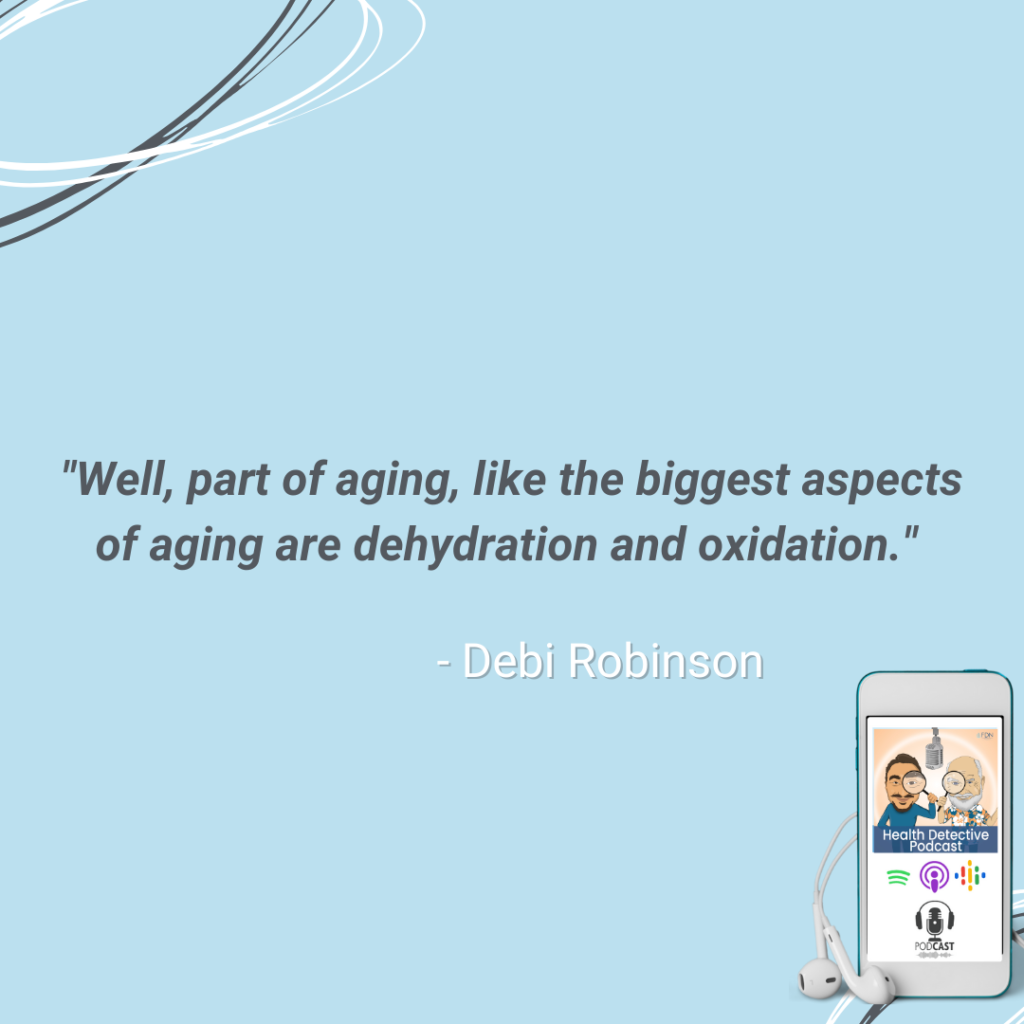
[00:37:05] Debi Robinson: Well, part of aging, like the biggest aspects of aging are dehydration and oxidation. On the HTMA yes, I see that calcium’s not in the bones where it belongs. It’s outside in the soft tissue often. I mean, often as in a very high percentage. I don’t know what that is, but definitely over 50%. I also see dehydration.
Looking at sodium and potassium and looking at sodium as a marker for potential indicator for dehydration. I do see that coming up on HTMAs. On the GI MAP, I see, anti-gliadin is almost everyone, whether they have a high SigA or low SigA, (it could be even higher than it is.) See a lot of inflammation. See a lot of steatocrit. Is that how you say it? Steatocrit?
Beating Osteoporosis – Improper Fat Metabolism and Intestinal Issues
[00:37:42] Detective Ev: I always say steatocrit, but I’ve gotta be honest. I have no idea if that’s right.
[00:37:44] Debi Robinson: Tomatoes, tomatoes.
[00:37:47] Detective Ev: We know what it means. That’s all that matters.
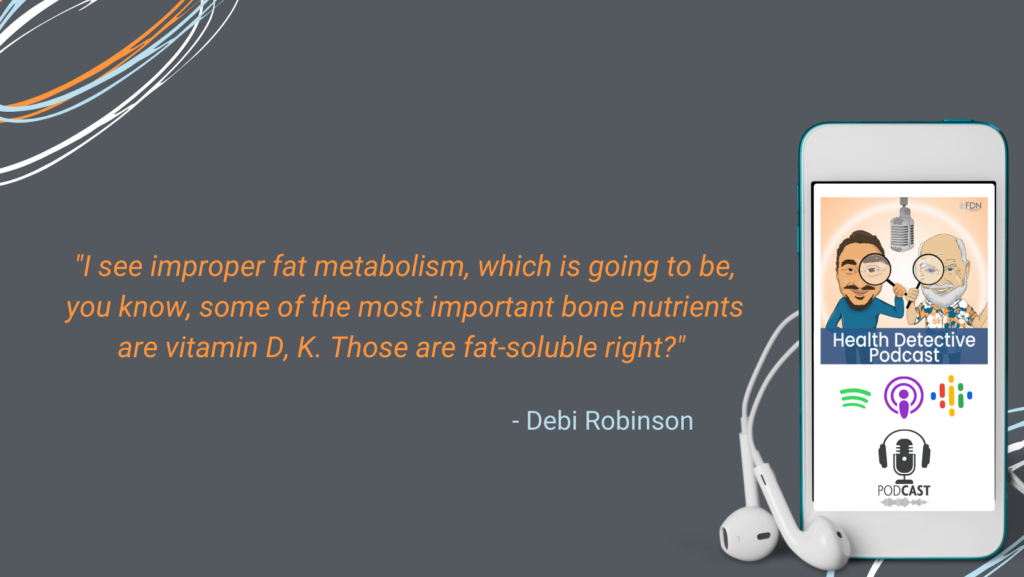
[00:37:48] Debi Robinson: I see improper fat metabolism, which is going to be, you know, some of the most important bone nutrients are vitamin D, K.
Those are fat-soluble right? So of course, A’s a player there as well, and we need all of it. So, they’re not even absorbing fat, their nutrients they need. Cause vitamin D helps calcium be absorbed, which is really a big aspect of bone health.
I see a lot of intestinal issues, whether it’s inflammation, poor digestion, low immune function. I see dysbiosis, I see inflammation, lots of H pylori and these women typically have indigestion. They’ve been on PPIs. I think a lot of PPI use in your thirties and forties eventually leads to osteoporosis because it doesn’t allow the absorption of what’s important to be building the bone.
[00:38:35] Detective Ev: That is really fascinating. For those that don’t know, PPIs are proton pump inhibitors. Do you want to give like a layman’s explanation for them? Like break that down what that actually is? Because people have probably maybe heard of that, but they might not exactly know what medications we’re talking about. These are really common, unfortunately.
Beating Osteoporosis – PPI Use, Stopping Digestion
[00:38:50] Debi Robinson: Well, they’re acid blockers. Typically, people are having indigestion or burning, you know, acid reflux. They go to the doctor and the doctor thinks, well, if the acid’s coming in here and burning you, let me stop the acid. Well, we need the acid because the acid is what’s going to break down all the food into the pieces that it needs to be broken down into so it can actually be absorbed and assimilated and becomes the cells, the tissues, the organ systems, the bones. Digestion is so critical.
Another thing I would say about my generation, my population and my generation, it’s me and people a little bit older than me, is that there was a real aspect of trying to be thin. I know that that exists today, but it’s kind of different. There was really this drive to be thin and to not eat. Then there was a whole fat-free movement that we went through and all of that. It’s all this like starvation, it’s really a form of starvation, right? Whether it’s, self-inflicted, back to the mind, Evan, always, whether it was self-inflicted, known or unknown.
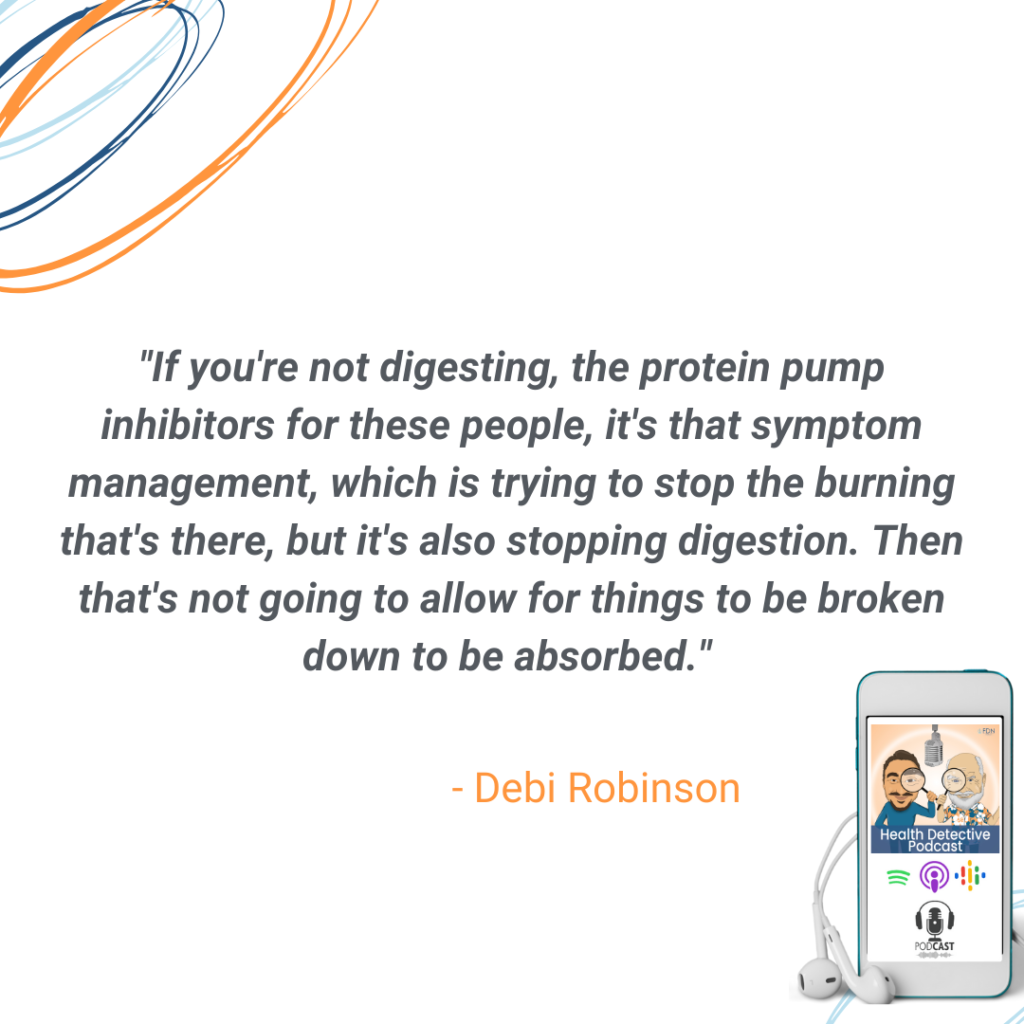
If you’re not digesting, the protein pump inhibitors for these people, it’s that symptom management, which is trying to stop the burning that’s there, but it’s also stopping digestion. Then that’s not going to allow for things to be broken down to be absorbed. It’s also not going to feed the good gut microbes that actually produce the short chain fatty acids that produce the mucosal barrier.
Now you’re going to have things getting in your system, which is going to cause inflammation and dah, dah, dah. Protein pump inhibitors. It’s symptom management.
Beating Osteoporosis – Too Little Stomach Acid
[00:40:12] Detective Ev: See, what’s so cool about FDN is you just learn about so many things that seem to not really make sense in practice. Then actually, why it doesn’t make sense, because what we’re talking about here, right?
People think, well, isn’t that logical. I have too much stomach acid. Because the thought is that it must be too much stomach acid. The truth is guys, if you actually do the research on this, there are very few people that have excessive stomach acid. You can actually only get so excessive with it. It would cause a very legitimate problem that you would not be able to avoid.
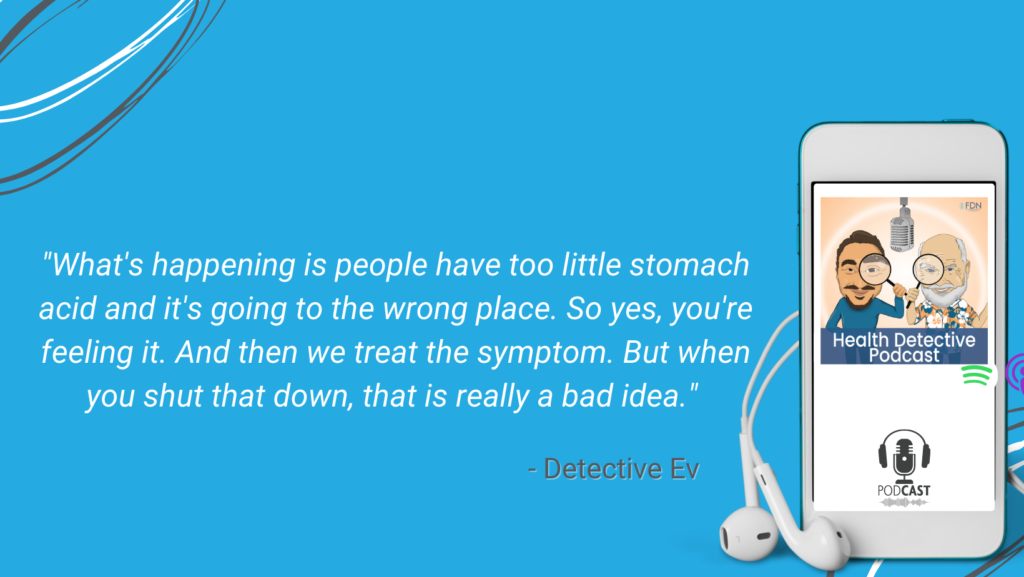
What’s happening is people have too little stomach acid and it’s going to the wrong place. So yes, you’re feeling it. And then we treat the symptom. But when you shut that down, that is really a bad idea.
They were trying to put me on that at like age 14, 15, because I had GERD. Thank God, we never ended up (we being like my family and I), never really encouraged me to take it off. And I probably only took the pill a few times.
But that’s the thing, it’s like when we’re shutting down that stomach acid, the very minimal amount that I already probably had, we are opening up the flood gates for infection because that’s what’s killing off a lot of these bugs when they first get in.
Who’s Gonna Ask the Questions if You Don’t?
Now you have these nutrient deficiencies as well. We need to be able to break these things down and it’s not as if the majority of our world isn’t already nutrient deficient to begin with without these things. No one here has ever, ever, ever suggested not to take a medication or not to listen to your doctor, but you need to be the one to ask why I’m even on this, or what can I do to not be on this in the future?

Because I personally promise you one thing, you are not deficient in Prilosec. You’re not deficient in Tums. You’re not deficient in Pepto-Bismol. There’s gotta be something else going on there that’s leading to this. So yeah, if you need a medication cause you feel bad right now, that’s totally fine. No one wants anyone to be in pain, but we gotta be going past the surface level and asking why we even need this to begin with, you know?
Beating Osteoporosis – Needing that Functionally Minded Person
[00:41:53] Debi Robinson: Yeah. It’s not even your doctor. It would have to really be functional doctor because I know that H pylori, (you didn’t mention that you were talking about bacterial imbalances), but if you did have H pylori, which at least 50 plus percent of my clients seem to have, that’s going to try to neutralize the stomach acids.
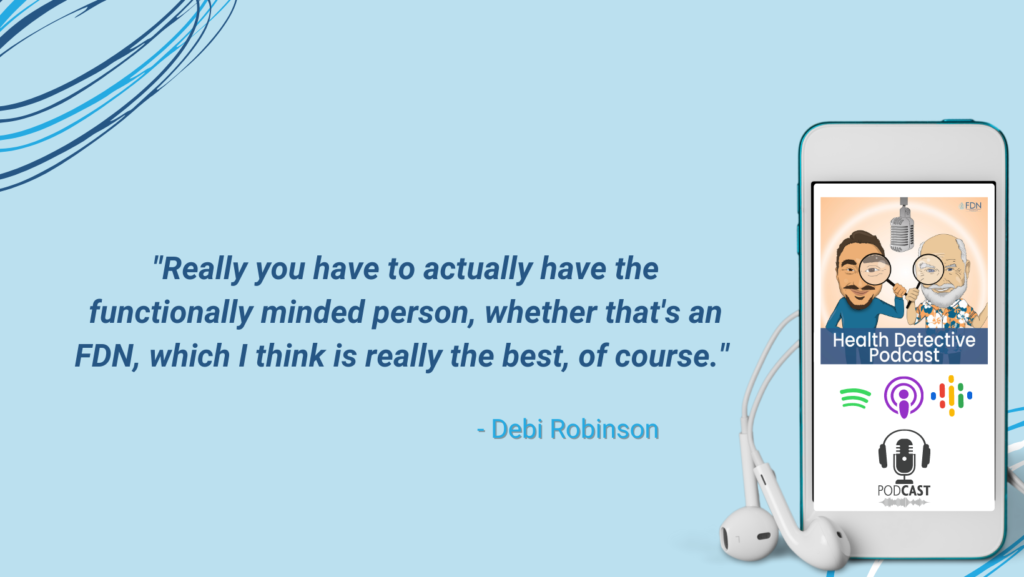
It doesn’t completely neutralize them. What comes back up into your esophagus is still going to burn. But it neutralizes them enough so that they can’t digest. You can’t digest and get all the nutrients you need. Really you have to actually have the functionally minded person, whether that’s an FDN, which I think is really the best, of course. We’re functionally minded and we’re looking for the root causes so that we could stop all of this instead of just using a garden hose to put out the fire.
We want to actually really get to the root cause and figure out what’s going on to stop it at that level.
[00:42:40] Detective Ev: You know, I had to always identify in the beginning of this podcast, like, listen, of course I’m biased towards FDN. But my goodness, after 130 plus episodes with these stories, I think you guys, it’s a fair bias.
I think our world of FDN, we really are producing people who have these incredible stories. I mean, I can’t believe it sometimes. Then you and I, we haven’t really even ever gotten to interact in our years here at FDN. Then I get to hear your story and I’m like, okay. What the heck, right?
Beating Osteoporosis – The FDN System
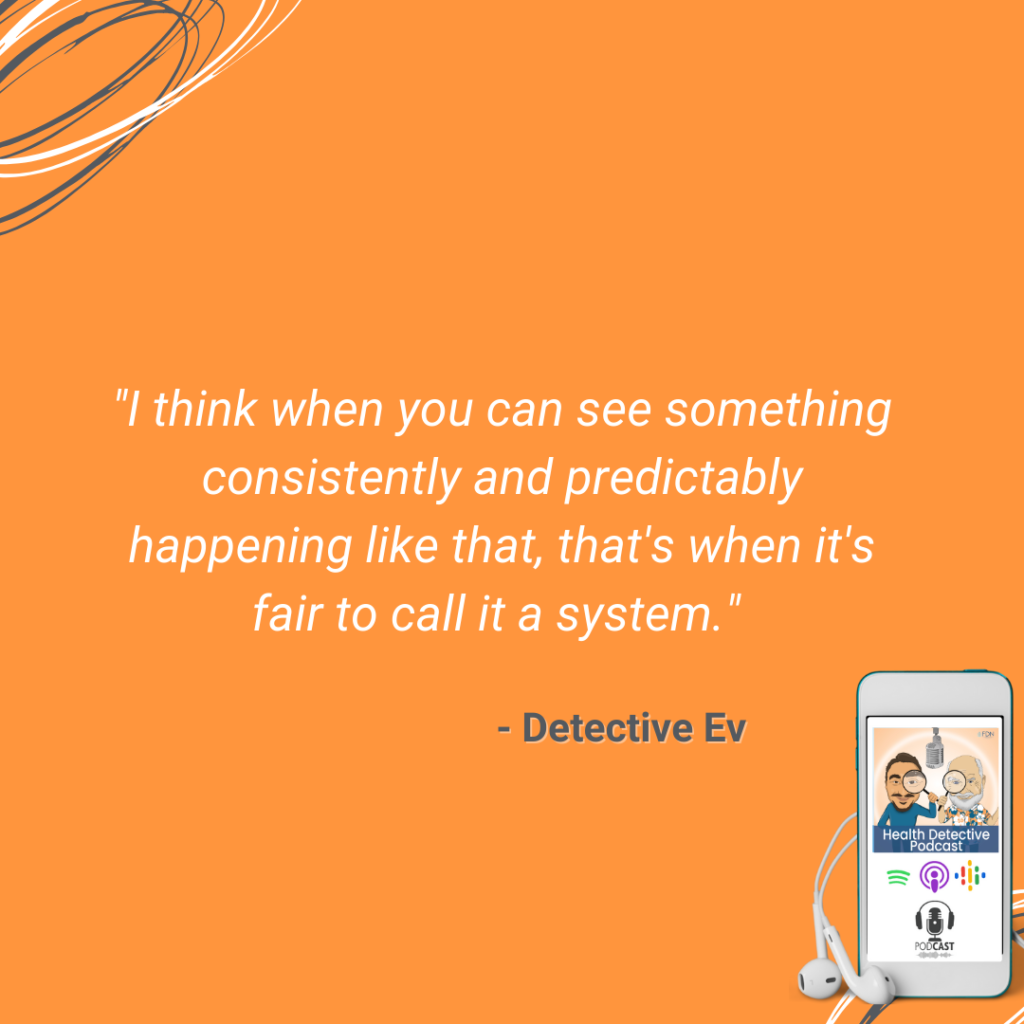
I mean, you’re doing this incredible work. I’m doing this incredible work. We don’t even really know that we’re doing those things. It’s happening all the time. All these clients are getting results. All the practitioners are getting results. I think when you can see something consistently and predictably happening like that, that’s when it’s fair to call it a system.
This isn’t just, we get lucky every now and then. This is pretty much consistently happening for most people with a variety of conditions. Because even though we have certain FDNs that niche in certain things, and that’s totally smart from a business sense, we’re never treating anything specifically. We address everything non-specifically and it turns out shocking for most people.
You’re not supposed to have osteoporosis. So, when you address everything non-specifically, by definition if you do that right, the osteoporosis will get better.
I can’t believe how fast our time’s flying here. As someone who is working specifically with this population, primarily, and of course, many people that are clicking on this podcast want to hear about this. I’m just curious if you have like maybe one or two client testimonials that were really phenomenal that are coming to you off the top of your head. I always love when FDNs come on and share some great stories that they have from their clients.
Beating Osteoporosis – Client Success Story
[00:44:08] Debi Robinson: Yeah. One woman within the first week, what she told me was, she said, honestly, it was about a week into this with you that everything changed, that my all my digestive issues stopped.
She had had digestive issues for 10 years. Had not lost weight for 10 years. She’s 70 years old. Hadn’t lost weight for 10 years. I don’t know if I said 10 pounds earlier, but for 10 years she hadn’t lost weight. She’d been in major digestive discomfort, has to get in bed, crawled up into a ball when she’s in the throes of it. Has a food journal, follows the FODMAP, follows the university – the University Monash.
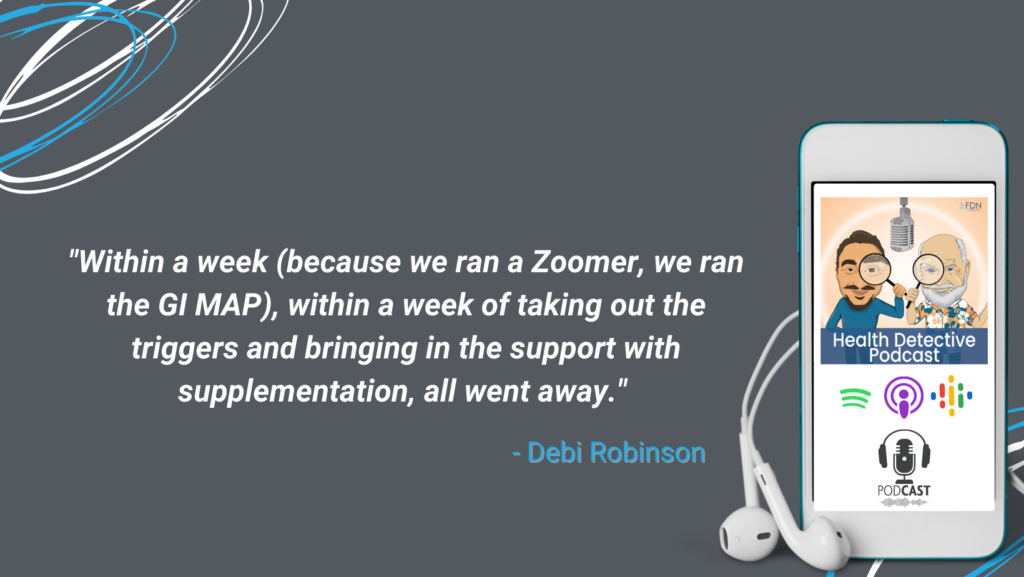
She was journaling her food, really meticulously trying to figure out what to eat. Going to restaurants, pushing things around her plate to try to make sure she only had the thing she needed and blah, blah, blah. Within a week (because we ran a Zoomer, we ran the GI MAP), within a week of taking out the triggers and bringing in the support with supplementation, all went away.
When I asked her four or five months later, okay, what would you say? Where are you at now in terms of health? You know, from one to ten, like, where would you say on that? She goes, eight or nine out of ten. She said, I’m like 85% better. I mean, this is like three months into her protocol.
Beating Osteoporosis – Using FDN and Yoga
It’s just really amazing when that happens. That happens often. I would say digestive discomfort is one of the quickest things you can manage when you do the GI MAP and the food sensitivities. You take that out and you bring in the support.
Then another one, I remember one time she said to me, everyone should be doing this with you. Yes, they should, and tell all your friends.
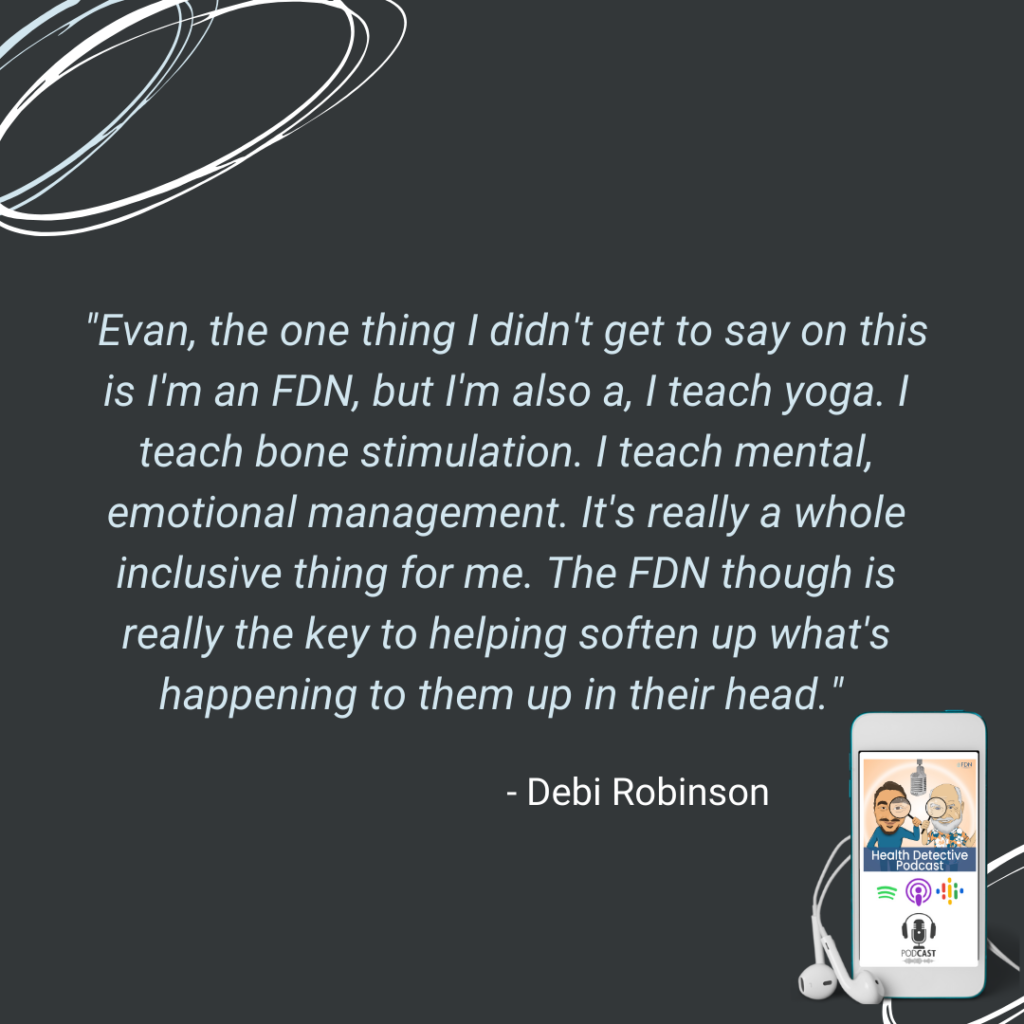
Evan, the one thing I didn’t get to say on this is I’m an FDN, but I’m also a, I teach yoga. I teach bone stimulation. I teach mental, emotional management. It’s really a whole inclusive thing for me. The FDN though is really the key to helping soften up what’s happening to them up in their head. Because that feeling of fragility when we run labs and when they can start really feeling better, even physically.
One time, one woman said, oh my gosh, it’s crazy the amount of energy I have. She goes, I’m like cleaning things and doing things I haven’t done around the house in years.
[00:46:13] Detective Ev: Yeah. It’s awesome. And that first client, you said, just to be clear for everyone, that was a 70-year-old person, you said?
Beating Osteoporosis – More Success from the Success Story
[00:46:17] Debi Robinson: The first one I’m telling you about is 70. The second one I told you about is 75. It’s for the first time in years, like to get your life back.
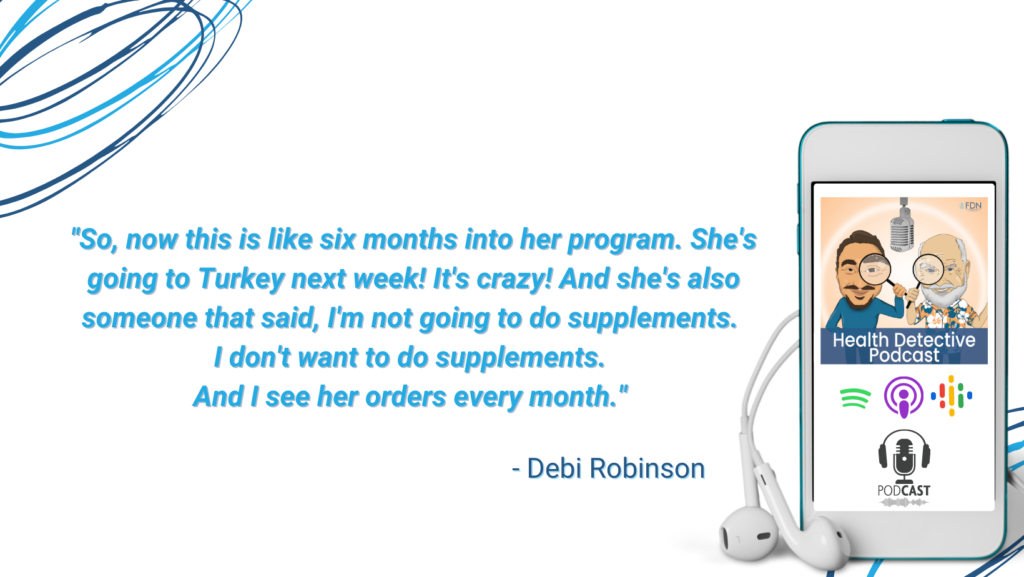
Oh, and that woman. So, now this is like six months into her program. She’s going to Turkey next week! It’s crazy! And she’s also someone that said, I’m not going to do supplements. I don’t want to do supplements. And I see her orders every month. Support is her new best friend, her digestive enzymes, her bitters. I told her, I said, well, when you go to Turkey, there’s some things you need to take with you.
Beating Osteoporosis – Applying Physical & Mental/Emotional Modalities
I also do the breath work. I do the present moment. I do the vitamins that I recommend for yoga. Can I tell you? Vitamin T is tree posture. That’s a single leg balance, which strengthens the leg bone, strengthens the muscles, strengthens the hip.
The other one that you said you start your day off with is vitamin G, gratitude. Because we cannot be in the limbic brain and the prefrontal portal brain at the same time, we cannot. When you’re in here in a place of gratitude, you bring yourself from invisible, some conscious thoughts, chronic stress, catabolic breakdown, HPA axis, to prefrontal cortical brain. This is where we can be reasoning.
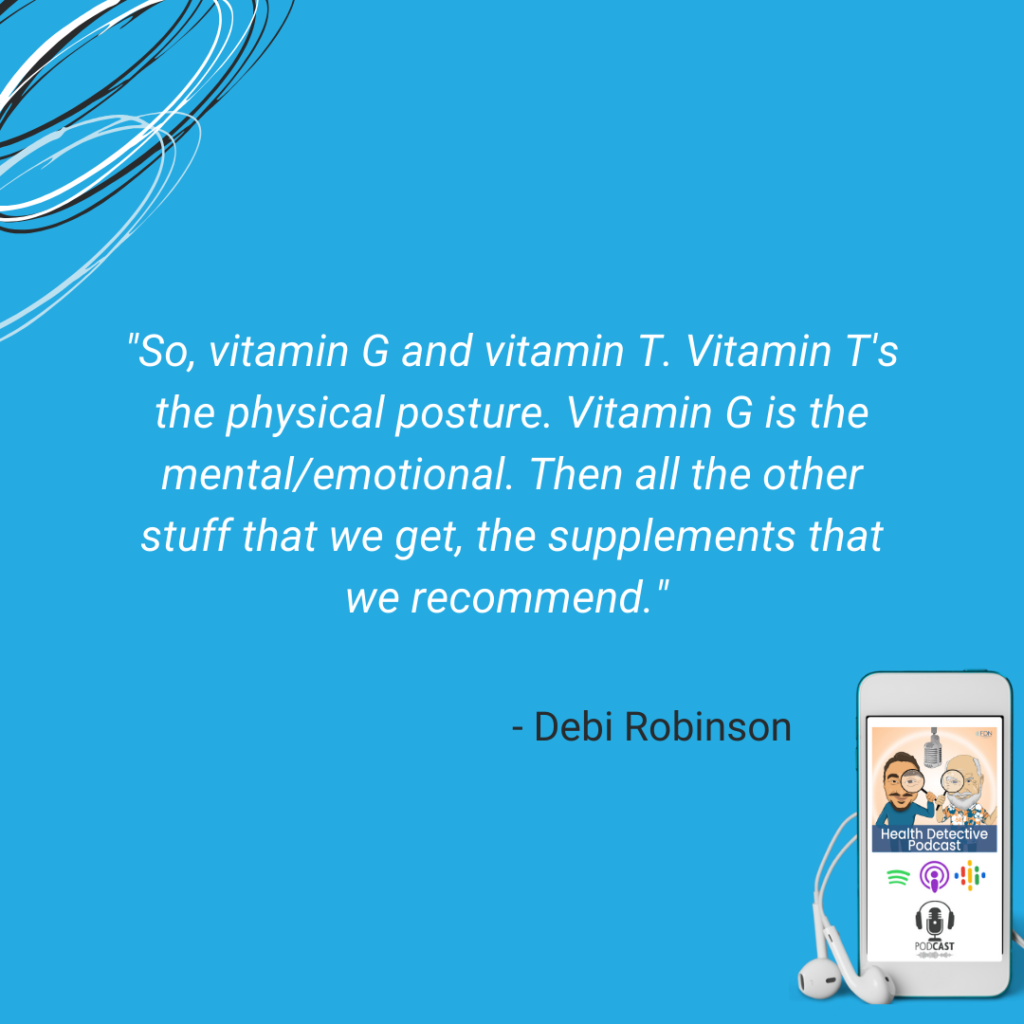
So, vitamin G and vitamin T. Vitamin T’s the physical posture. Vitamin G is the mental/emotional. Then all the other stuff that we get, the supplements that we recommend.
Beating Osteoporosis – It’s Never Too Late
[00:47:32] Detective Ev: It’s so cool. The reason I wanted to emphasize that person being 70 and it’s even better to know the other one was 75. I had someone when I was doing the course enrollment side of thing here at FDN, I had someone call and I think they were around like 55. They’re like, well, do you think this is too late to start the course? I’m like, what?
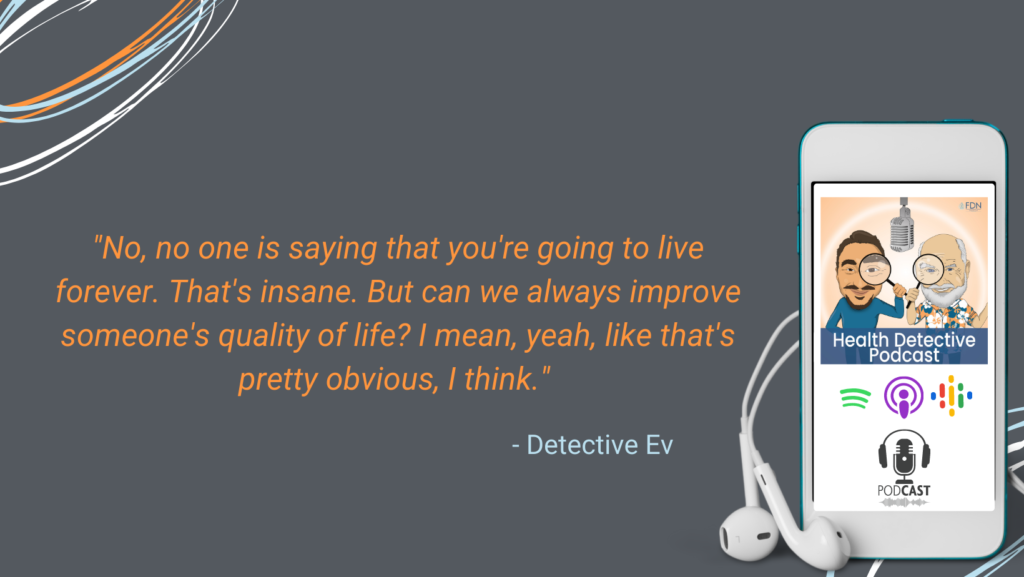
First of all, we have people that go through it, like 65. They’ve already done a 40-year career, and now they’re coming and doing something else, which I think is so brilliant. But outside of that, I’m like, unless you’re dead, it’s not too late. If you ask me, like we could always improve our health. No, no one is saying that you’re going to live forever. That’s insane. But can we always improve someone’s quality of life? I mean, yeah, like that’s pretty obvious, I think.
Maybe it’s not obvious to them. Maybe they haven’t had the blessing of being involved in this world where you get to see and hear stories like this all the time. But to me, I’m just like, why would you think that there’s some cap on this? Like yeah. All of a sudden you turn 55. It’s 55 years old, three months and 22 days. That’s exactly when this doesn’t work anymore.
Like when you word it like that, you realize how ridiculous it is.
Beating Osteoporosis – Going up by 11%
[00:48:29] Debi Robinson: You know, it’s so crazy without you realizing. I’m going to say that age that you just said right there is probably when my world started taking off.
[00:48:37] Detective Ev: Yeah.
[00:48:38] Debi Robinson: That’s when it started taking off for me. Sometimes it’s easier for somebody that’s in their sixties or fifties to listen to someone else that’s in their sixties or fifties. I mean, I am my avatar.

I am my avatar. You didn’t ask me this, but yes, I have osteopenia. I had a hip replacement and I had osteopenia. For many years I was dysfunctional. Then two years later on my DEXA scan, I increased 0.2, which is 11%, which is like, wow! How did I do that? By running these functional labs, by being the best I could be biochemically, by pulling and pushing on my bones and creating the appropriate stress. Using stress as my friend with my bones to make them stronger, to make them have to be stronger for me appropriately.
Then that mental/emotional management, that stress management every day, all day. Meditation is present moment awareness. You don’t have to do it for an hour. You don’t do it for 10 minutes. It’s present moment. It’s the self-talk that you have with yourself. So self-talk we have with ourselves. We have to do it all. We’re a mind body complex.
[00:49:36] Detective Ev: 11% – that’s awesome! I’m going to guess they’re not used to seeing people, considering they think it’s impossible to resolve this stuff, go up by 11%. Right? Was that a pretty interesting conversation?
[00:49:46] Debi Robinson: I haven’t had the conversation with her yet.
Oh, okay. Got it. Got it. It was just August that I got my results.
[00:49:49] Detective Ev: Sweet.
Where to Find Debi Robinson
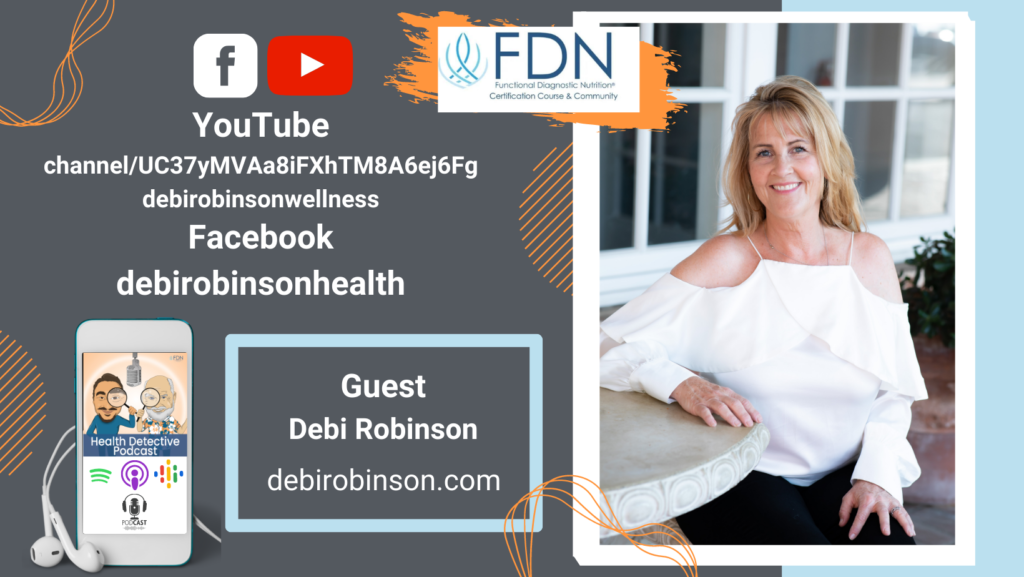
So, Debi, this has been so much fun. I have to finish up with a couple more things. One is obvious. Where can people find you if they want to work with someone like you? Because again, no one has come on that focuses just on this.
[00:50:01] Debi Robinson: Okay. My name is Debi Robinson.
I spell Debi, D E B I. So, it’s debirobinson.com. That’s my website. Then my YouTube is Debi Robinson Wellness. I do teach five live classes a week. Two of them are specific to bone health. And my Instagram, debirobinsonwellness.
[00:50:17] Detective Ev: Okay, that makes total sense. You have such a wonderful presence, and you just seem like you do this more often than not.
I’m not surprised by the YouTube thing. That makes sense. And of course, guys, we will have this in the show notes where you can all find it.
Two more things. One just is kind of a quick one, but you can answer it as much as you want. How much of this, because you have done so much before, and it sounds like FDN is a huge part of it, but what percentage would you say is FDN in the success that you’re having now in your own practice and doing the work that you’re doing?
Like how much has that contributed to the success? It’s such a large percentage.
Beating Osteoporosis – Driven by the Driver
[00:50:46] Debi Robinson: I’ve been teaching yoga and I teach for a hospital in Southern California. I teach to nurses, the aging population, that’s been great. But to go to this next level has all been about FDN really, truly. I mean, just big things are happening for me, Evan. I’m seriously waitlist right now. Prices. I mean, things are just like, wshew for me right now.
I feel like I’m gonna have to hire FDNs. So, if there’s any 50- and 60-year old’s out there that are getting in, I do think that that’s going to happen. I’m going to have to have my own like center where we do this because the demand is ridiculous.
I was just on a summit recently. I just had 15 onboarding calls. I just, I can’t right now.
[00:51:26] Detective Ev: That is a good problem to have.
[00:51:28] Debi Robinson: FDN is a lot of this Evan, a lot, a lot, a lot. Because I have a population that has the money to spend and wants to be healthy and knows that they’re not like in their twenties or thirties anymore. They’re not thinking that they’re going to live forever.
You know, I had a hip replacement at 50 and the reason why I did, 51, is because I realized at that point, I had 40 more years probably to live. 40 more years. When I thought about it that way, it made me think. Because I was 30 pounds more than I am now, had a handicap placard, was not living my life at all.

I made that decision that, you know what, I have 40 more years, I want to live big. That is what is really important I think, is thinking of it that way. That’s that driver.
Signature Question – Gratitude
[00:52:07] Detective Ev: All right. Our signature question on the podcast, that’s what we always finish with. It’s not necessarily about osteoporosis, just a general health question.
Our question for you is if I could give Debi a magic wand and you could get every single person in this world to do one thing for their health, whether that’s literally do one thing or not do one thing, what is the one thing you’d get them to do?
[00:52:29] Debi Robinson: Vitamin G. Vitamin G. I get them to close their eyes, connect to their breath, feel their body, feel their seat, feel their feet, feel their tushy in the chair, feet on the floor and start bringing into their awareness all that they have. All that they have.
Vitamin G. Vitamin G. Vitamin G. I’d even say to take an overdose on vitamin G. That’s really where happiness is, Evan. What the heck are we here for? What are we doing in our lives? We get so caught up in everything else, and then you need to come to like, stop right here.
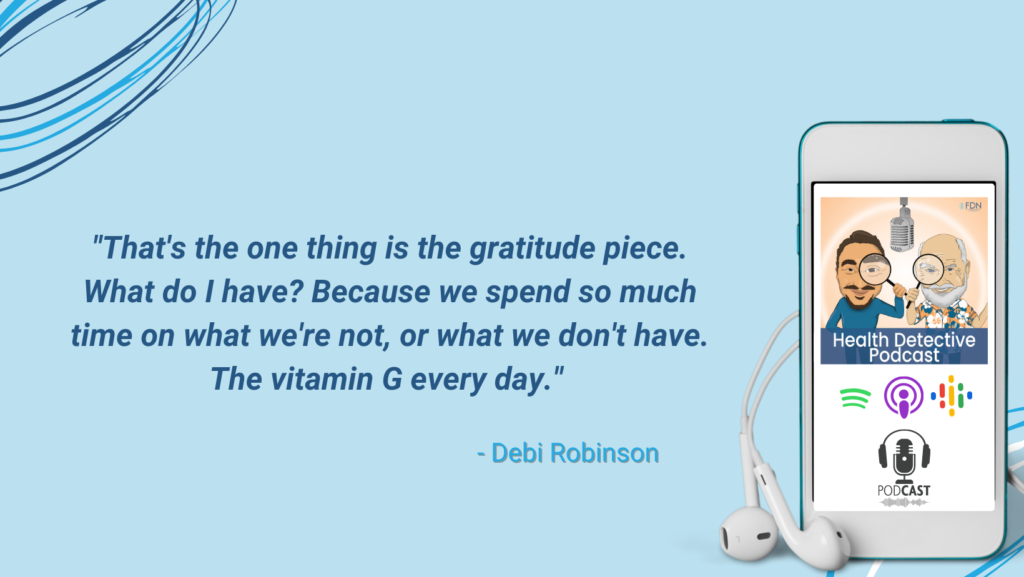
That’s the one thing is the gratitude piece. What do I have? Because we spend so much time on what we’re not, or what we don’t have. The vitamin G every day. How many doses? I don’t know. That’s what I should come up with. Right? The doses of vitamin G. Lots. Unlimited.
Conclusion
[00:53:14] Detective Ev: All right. My friends that’ll do it for today’s show with Debi Robinson.
I hope that you enjoyed this. And remember if you have a specific request, if you want to learn about the FDN course, if you want to hear a specific type of topic, all you ever have to do is go to our Podbean and leave a comment there. Just search for the Health Detective Podcast on Podbean, we will come right up.
Tell me what you want, and I’ll happily post it for you. Okay. I’ll do the best that I can. Also, if you enjoy this information, please consider leaving us a five-star review on Apple and/or Spotify. If you do that, we will love you more than we already do. Until next time, take care. I’m looking forward to talking to you guys again soon.

